Synology DS3622xs+ NAS Review – Game Changer?
Reviewing the new Synology DS3621xs+ NAS is something that is going to be a little tough, given the huge range of buyers who see this particular server as the ‘ultimate private desktop NAS server’. If you have been looking at moving your mid-to-high sized company data operations away from popular cloud services in the last year or so, then there is a good chance that you have been looking at Synology as your private platform of choice. The same goes for large Virtual Machine operations, multi-site surveillance setups and even Plex Media server users who want phenomenal futureproofing moving forward. The DS36XXxs series has been around for a decade or more and in that time only 4 solutions have ever been included, the DS3611xs, DS3612xs, the DS3617xs and now, the DS3622xs+ – so there is ALOT for this new powerhouse desktop NAS solution to live up to. Factors such as its internal performance, external bandwidth, its scalability and ultimately its justification in price to replace your popular 3rd party subscription services – there is ALOT to take into consideration. So, in today’s review of the, I want to discuss the hardware, the software, where it shines and where it doesn’t, in efforts to help you decide whether the Synology DS3622xs+ NAS deserves your data. Let’s begin.
Synology DS3622xs+ NAS Review – Quick Conclusion
Unsurprisingly, the Synology DS3622xs+ is by FAR the most powerful and capable desktop NAS solution that the brand has ever produced – and that is not even a close-run thing. But we are still talking about a £2,500 box here (unpopulated) and you are going to expect that there is some serious horsepower here – So are you getting the most for your money here? Almost completely, yes. There are a few lingering things that some buyers will still not be in love with, such as the lack of M.2 caching bays, the lack of SAS support or the reduced support of 3rd party drive and network upgrade compatibility, but they do not undercut that this is a genuinely groundbreaking solution from Synology that provides the ultimate base to enjoy and make the most of the Synology DSM 7 platform in 2022 onwards. Once you breakdown everything included in this package, from DSMs software and services, to the tremendous bandwidth available here internally and externally, this compact tank-like NAS server is an absolute beast and a must for those that are keen on fully integrating a private cloud network and subscription-free SaaS-level setup across their company.
| Where to Buy a Product | |||
|
|
    
|

|
VISIT RETAILER ➤ |
 |
    
|

|
VISIT RETAILER ➤ |
Synology DS3622xs+ NAS Review – Packaging
The shipping container that the DS3622xs+ arrives in (I know this is dull for most of you, but some people genuinely care about this) is easily one of the most protected desktop solutions in the Synology portfolio. Arriving in a double layer of cardboard carton (rugged external shipping carton, livery and branded internal packaging box), the NAS on its own is over 9KG unpopulated and you can add another kilo or two to the shipping extras. So with that kind of weight in mind, you have to make serious considerations for shock and motion protection in transit.
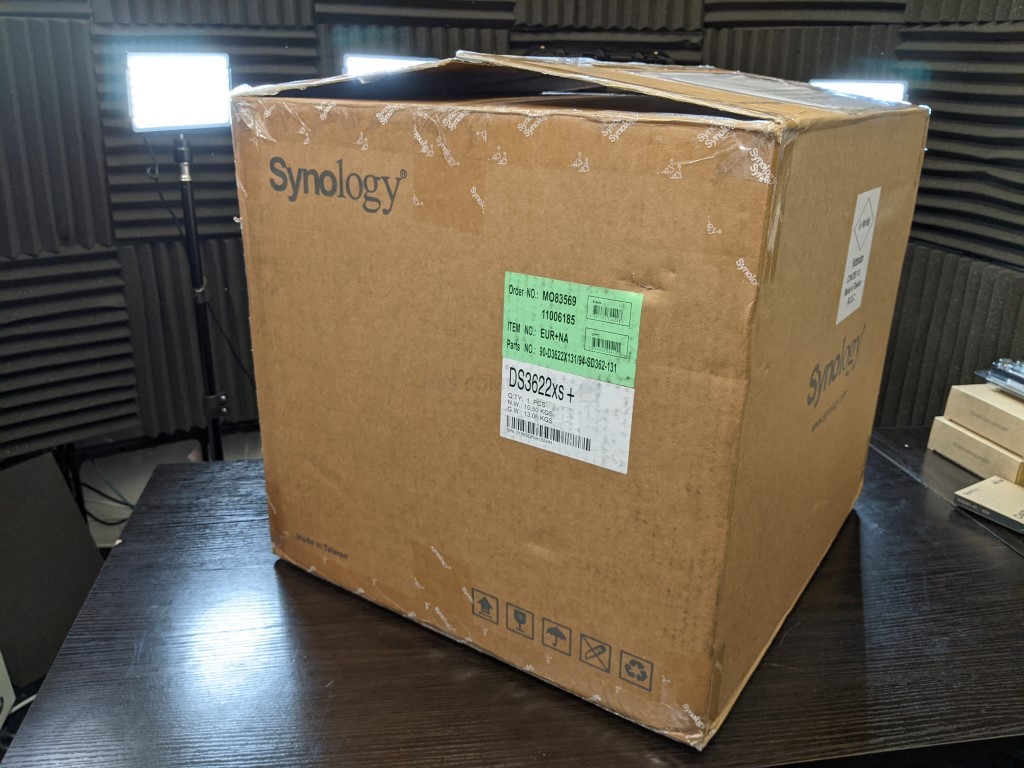
Unpacking the first couple of layers of the DS3622xs+ reveals that the NAS is also held in place with a surrounding frame of hard, rigid foam. Again, some brands might cut corners on protective shipping provisions on desktop solutions, in an effort to keep the profit margin a pinch higher. I am pleased to see that there is no evidence of that here on the DS3622xs+. Indeed, although the included accessories are a little thinner than I would have likely, I cannot fault the protection that Synology has afforded to this system in transit.
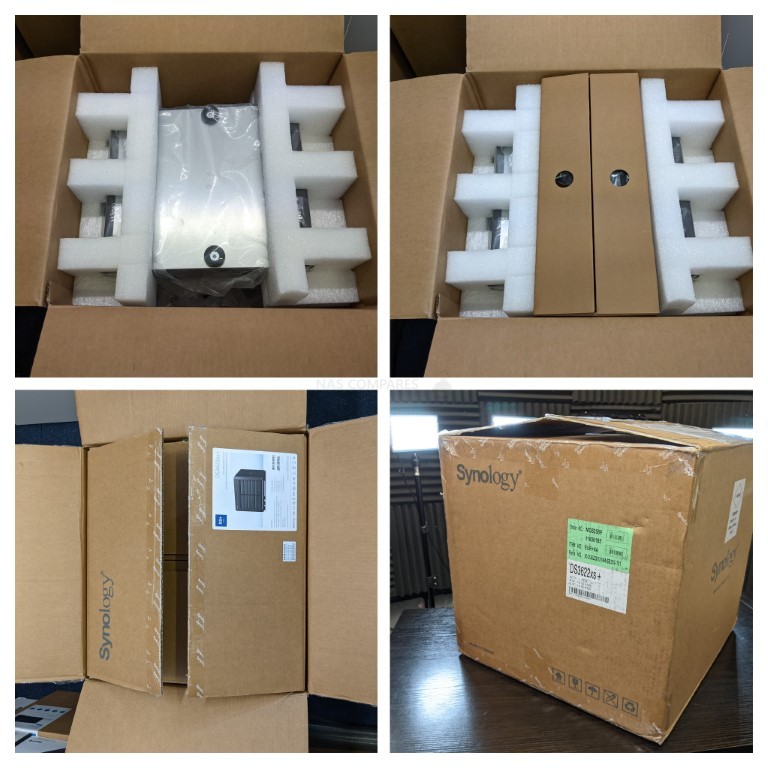
Unpacking the Synology DS3622xs+ NAS and laying out the entire contents, I was a little surprised by the accessories. Not disappointed, just a little surprised in some areas. The kit includes the NAS itself, external mains power cable (the system has a single internal 550W PSU), installation guide, screws for 2.5/3.5″ media, keys for those lockable trays and two RJ45 LAN cables.
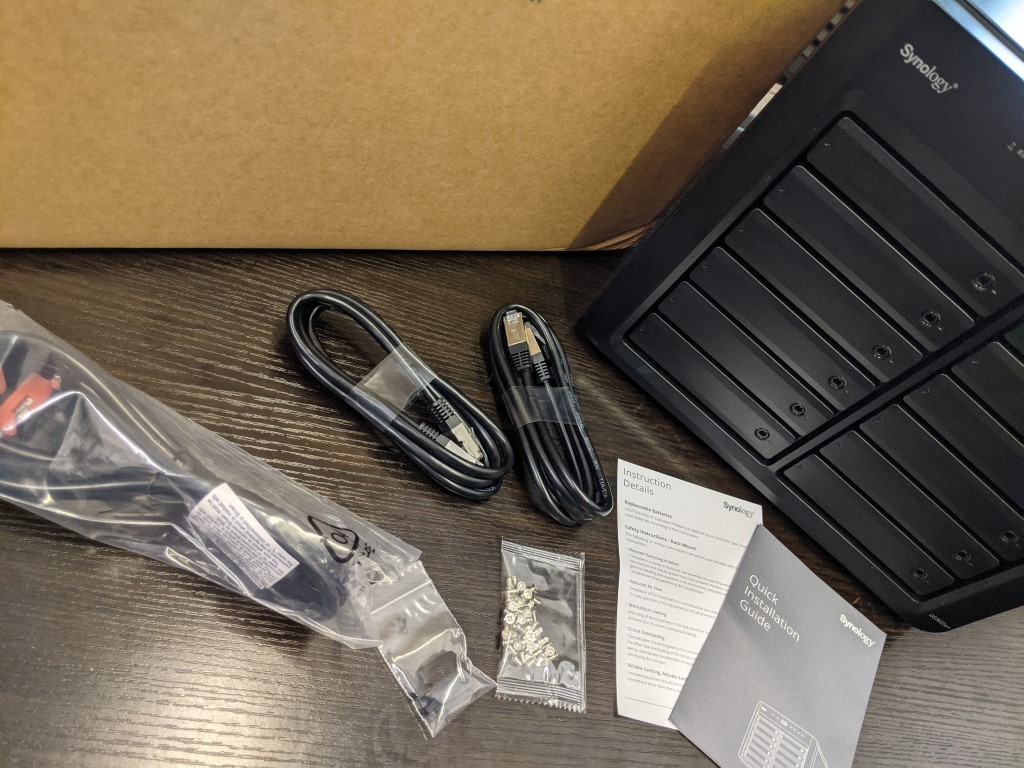
Now, this leads me to my first minor gripe – those ethernet cables. On the face of it, providing additional LAN cables is always good (the system has a possible 5 network connections by default), but the cables are Cat 5e, not Cat 6 – which is what I would expect from a 10GbE equipped solution like the DS3622xs+. This is an incredibly pedantic point I know, but it’s a small thing to have been overlooked and anyone that takes their 10GbE setup seriously will want to swap these out immediately. The main difference between CAT5e and CAT6 cable lies within the bandwidth, the cable can support for data transfer. CAT6 cables are designed for operating frequencies up to 250 MHz, compared to 100 Mhz for CAT5e. This means that a CAT6 cable can process more data at the same time. Think of it as the difference between a 2- and a 4-lane highway. On both, you can drive at the same speed, but a 4-lane highway can handle much more traffic at the same time.
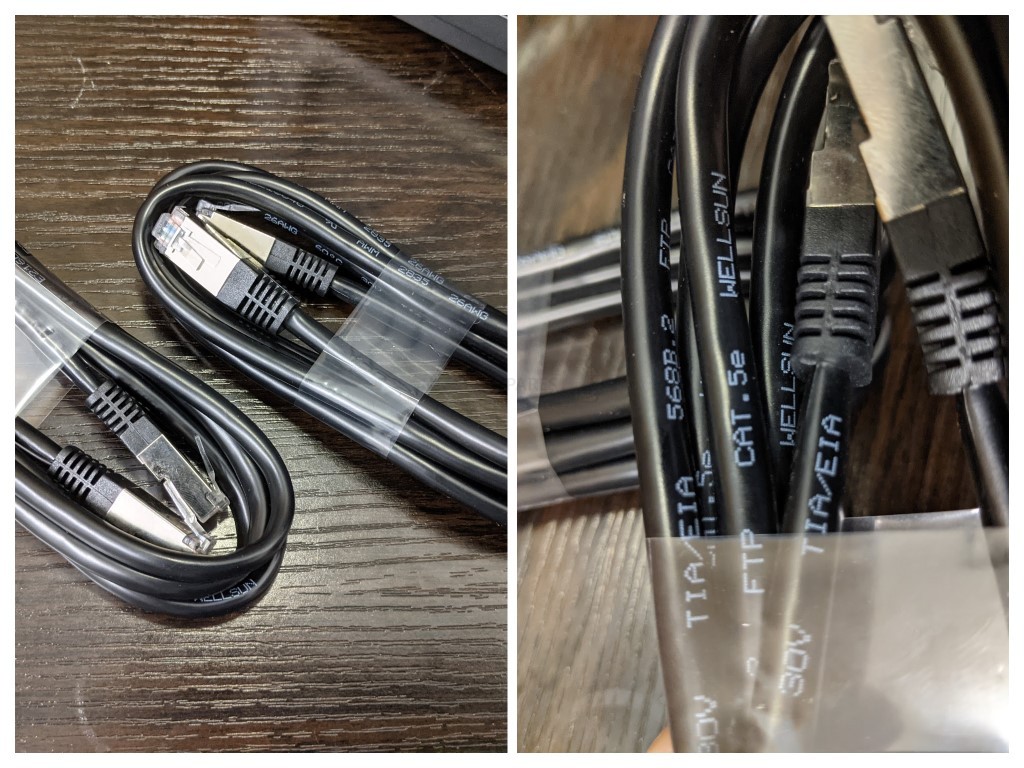
The rest o the accessories and kit are what you might expect and all agreeable. The paper manual is a little sparse, but these kinds of devices have always had a preference to push users to use online resources to setup these devices correctly and with frequent updates. The initial setup and installation of Synology NAS have always been remarkably easy and the contents of this paper manual are largely sufficient to help you through those early steps.
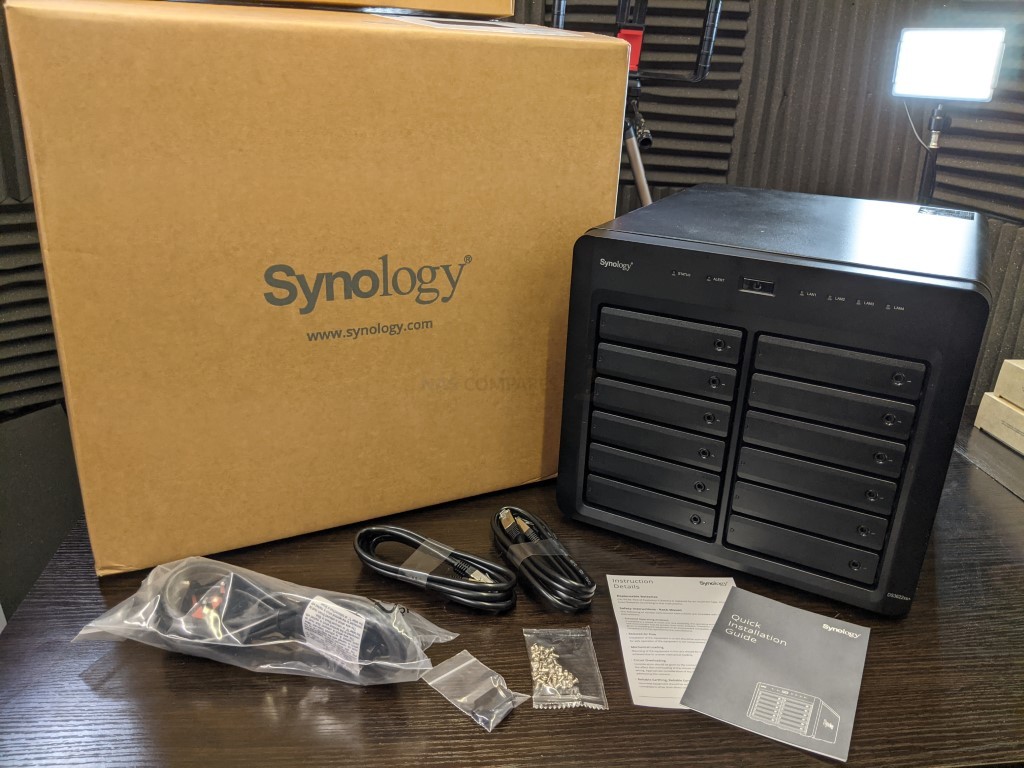
Let’s move over to the design of the DS3622xs+ NAS itself and how it has managed to house such a huge amount of storage, whilst still remaining rather compact in its physical shape.
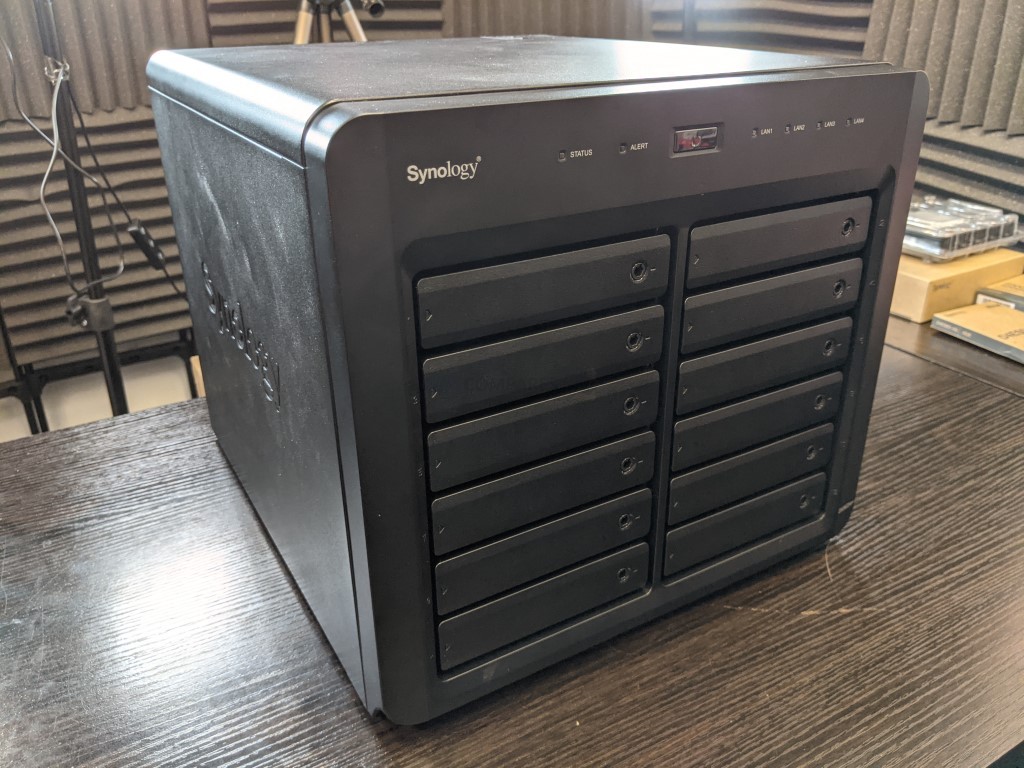
Synology DS3622xs+ NAS Review – Design
The DS3622xs+ uses a chassis that is very familiar and is one that (although tweaked in small places over time) has remained largely the same over the last 5 years throughout other releases (both in the XS family and PLUS series). It has always provided a good balance of storage, versus efficient airflow and heat dissipation.
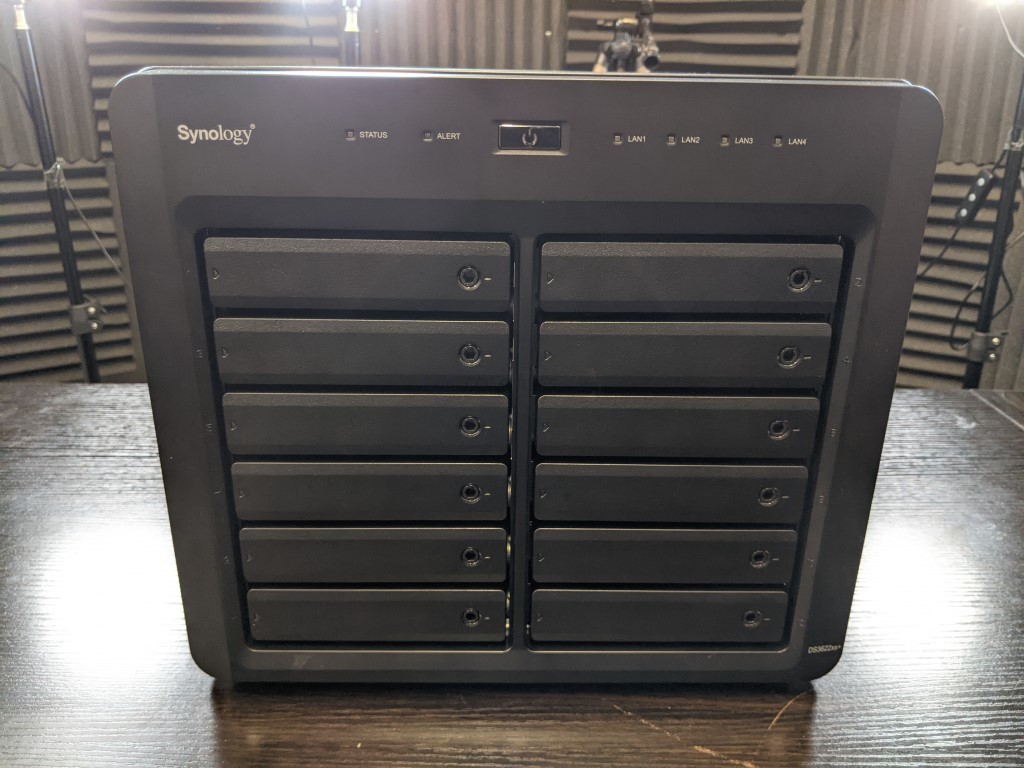
The DS3622xs+ chassis is almost entirely metal, with the only notable exception being the front panel of the desktop casing and the trays. This larger metal chassis, in conjunction with the 12 bays of SATA storage and twin rear fans results in a NAS that is most certainly going to make some noise. Although not reaching the “airplane take-off’ levels of noise that a rackmount like the RS3621xs+ reaches, the DS362xs+ is still a NAS that you do not want to be in close proximity with when in full operation. the official Synology pages highlight that the noise level is a reported 25 dB(A), however, this is based on the use of 2TB Seagate Ironwolf HDDs (which do not feature on the compatibility list I might add) and not the enterprise build HAT5300 Hard drives that this system is designed to be used with, which are a noticeable degree noisier due to their high performance, workload and durability design. Below is a quick vid on their noise level:
The front of the Synology DS3622xs+ has no LCD/Display panel, but rather it has numerous LEDs for displaying system, activity and access. These can all be adjusted in brightness and activity in the DSM 7 control panel, with eat pertaining to different areas of the system hardware – Hard drives, network status, network connectivity and system health.
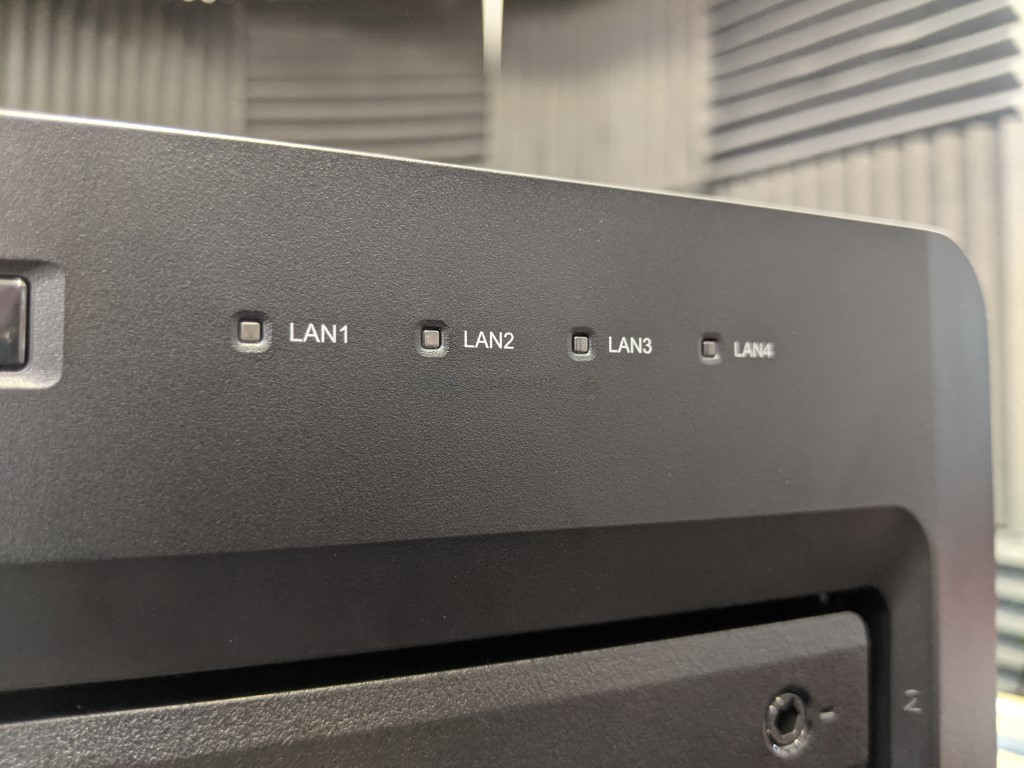
The 12 bays of storage featured on the DS3622xs+ are all well ventilated around the front oF the chassis and between each bay to allow passive airflow to flow as heat is dissipated inside. As mentioned earlier, the DS3622xs+ can run fully or partially populated, as well as be run on a single SATA HDD/SSD if need be (which would be rather daft). The system utilizes traditional RAID configurations to allow the end-user(s) to create a good balance of performance and redundancy in their storage over multiple drives. However, although the storage can be increased by adding further drives in available bays or an expansion chassis (the DX1222) the DS3622xs+ does NOT support the popular Synology Hybrid RAID (SHR) configuration that is available on the PLUS series and lower. Now, this is not a new thing and the XS/XS+ series of Synology NAS has never supported this configuration, for reasons of overall performance dip compared with traditional RAID levels (i.e. RAID 1,5,6,10,etc) on these solutions that are enterprise/big-data designed. However, the benefits of SHR in terms of scalability and adding larger capacity drives to your storage array years down the line (as larger capacities HDDs arrive and/or prices decrease per TB) has always been a compelling part of buyers who purchased the PLUS series and always a bit of a puzzler why it is not available here on an XS series solution. SHR on the DS3622xs+ is not impossible if you are migrating from an older NAS as shown here in this video, but it is still a shame it remains absent on the DS3622xs+ as a day 1 choice.
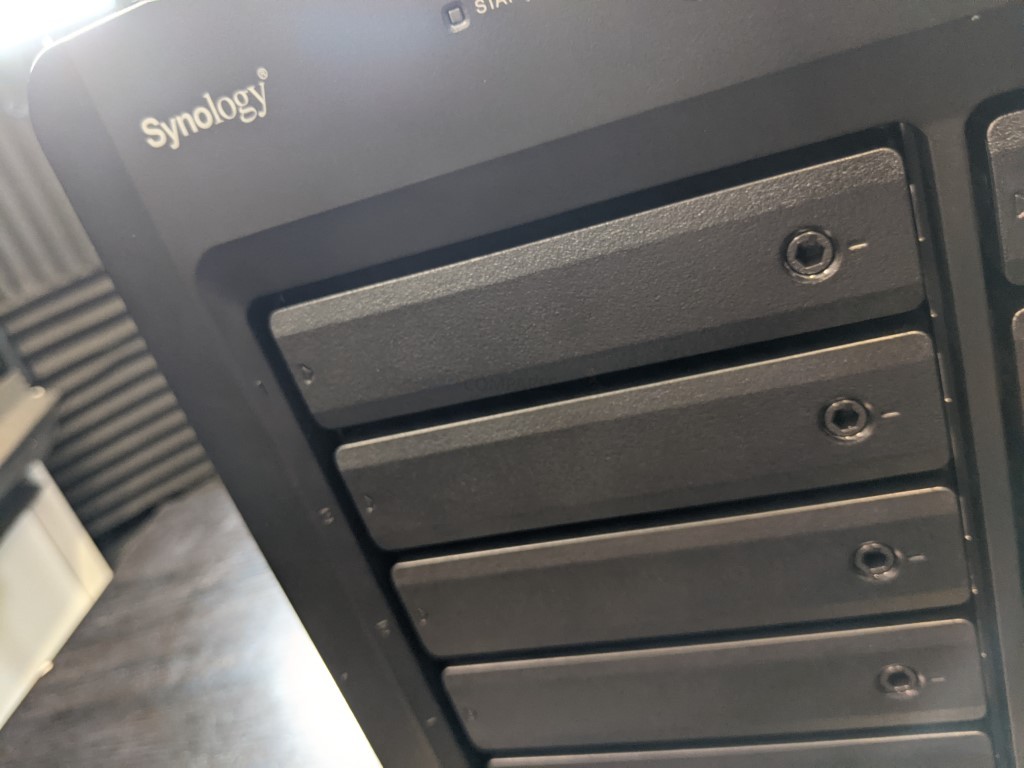
Each bay utilized a spring-loaded tray design that ensures that a drive will not be installed unless in full alignment with the internal SATA port inside. Additionally, each bay of the DS3622xs+ features a locking mechanism (with 2 keys included with your accessories pack) that ensures that accidental removal of an HDD/SSD in your NAS is not possible – this is especially useful as the DS3622xs+ does not support re-silvering and accidental removal of a drive for even just a single second can lead to hours upon hours or degraded RAID rebuilding.
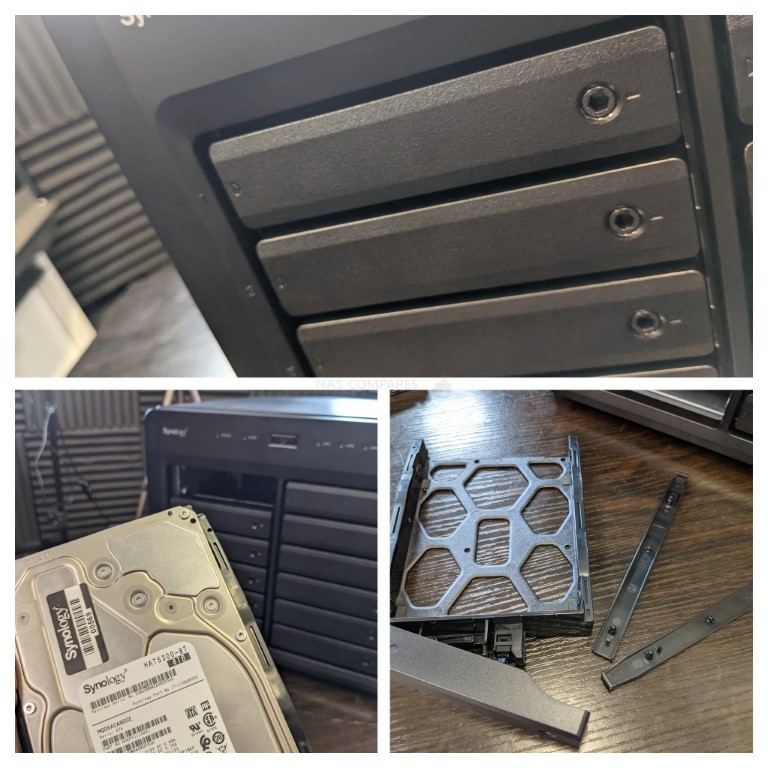
The trays themselves are plastic in design, but the days of this being a negative are largely gone now and although early versions of NAS servers have cheaper and less robust plastic trays, this new generation Synology NAS has exceptionally well made plastic trays that are sturdy enough for even excessing storage use. Each tray also takes advantage of a click n load design that allows 3.5″ media to be installed without screws/screwdriver. Alternatively, there are screws and screw-holes for the installation of 2.5″ SATA SSD media for faster storage pools and/or caching storage. However, on the subject of storage media on the DS3622xs+, we should probably address the hard drive shaped elephant in the room.
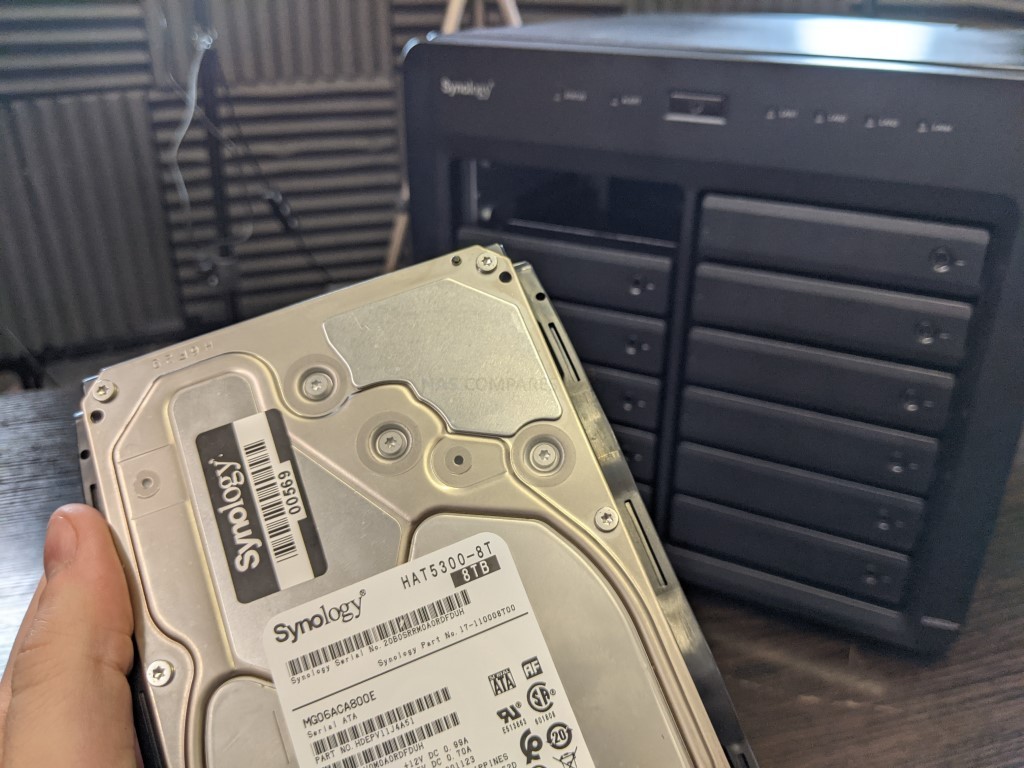
The DS3622xs+ NAS is another release in the Synology High-end/enterprise series that has opted for a much more streamlined compatibility list. This results in this NAS only being supported for use with Synology hard drives and SSDs. These include the HAT5300 and SAT5200 (along with a few others with upgrade options). Although there are a few exceptions to this, the compatibility list over on Synology.com is pretty clear on this:
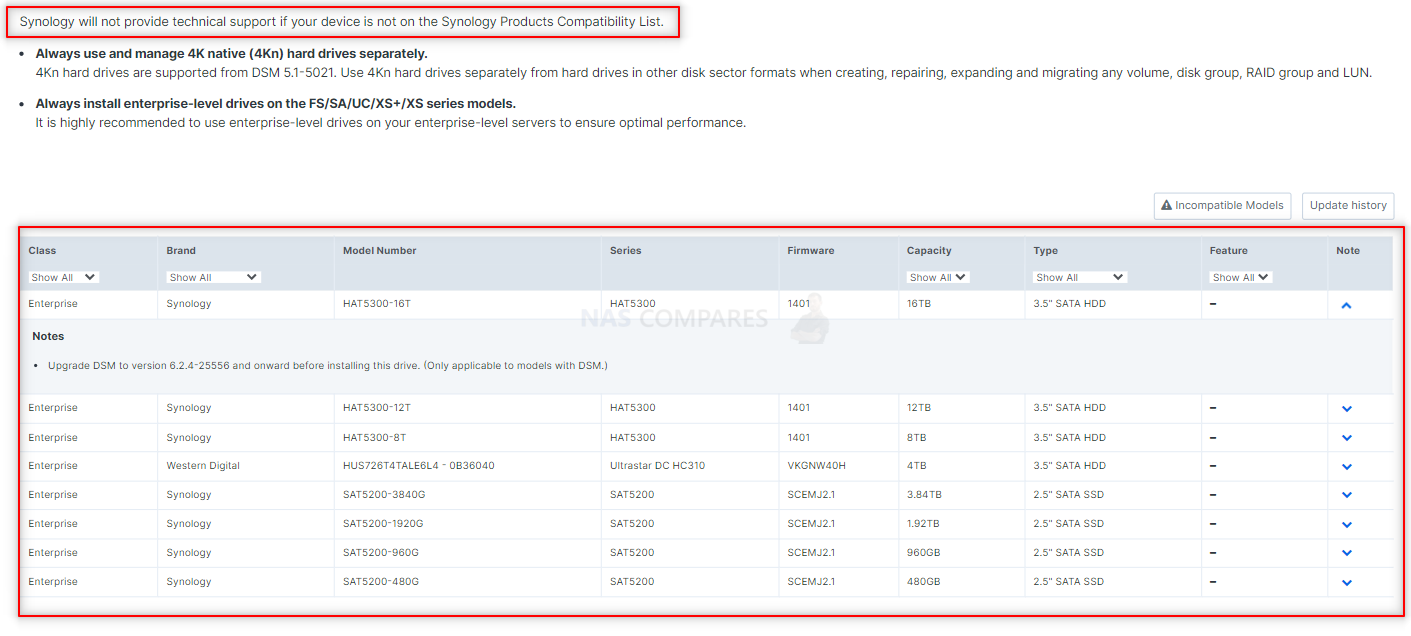
Synology’s decision to only allow the use of their own branded storage media on enterprise-level solutions was met with a mixed reception when it was rolled out in early 2020. On the one hand, the HAT5300 series of drives ARE good drives, arriving at a price point similar to the likes of Seagate Ironwolf Pro and WD Red Pro Pro-class Drives BUT featuring the architecture, performance and durability of Enterprise-class drives (such as Seagate EXOs and WD Gold) – it is a pretty good deal. Likewise, those looking for a full ‘one party’ solution will be pleased as it allows simple installation, deployment and management (with firmware updates and drive warranties being considerably easier to manage). However, with only three capacities of HAT5300 (8, 12 and 16TB) at the moment, as well as a relatively sudden pull on the support of other hard drive brands on this system, it has left quite a few users unhappy. Likewise, the decision in DSM 7 for the storage manager to prevent the use of non-compatible (i.e non-Synology) hard drives to be used in a storage pool completely, seems a touch aggressive in its presentation. As I have mentioned previously, I do actually quite like the HAT5300 series of hard drives, but the push by the brand to over-simplify the compatibility and support of 3rd party drives is something that I am less keen on and definitely do not want to see being extended to the rest of the PLUS/SMB line up lower down the portfolio in 2022.
nevertheless, the HAT5300 and SAT5200 series are still exceptionally good drives for this system and its XEON CPU, 16GB memory and twin 10GbE ports to sink its teeth into and when fully populated and equipped with 4x10GbE connections banded together (2x on-board 10GBASE-T + 2x 10GBASE-T on the E10G18-G2) has been reported to reach 4,719MB/s Sequential Read and over a quarter of a million 4K random Read IOPS.
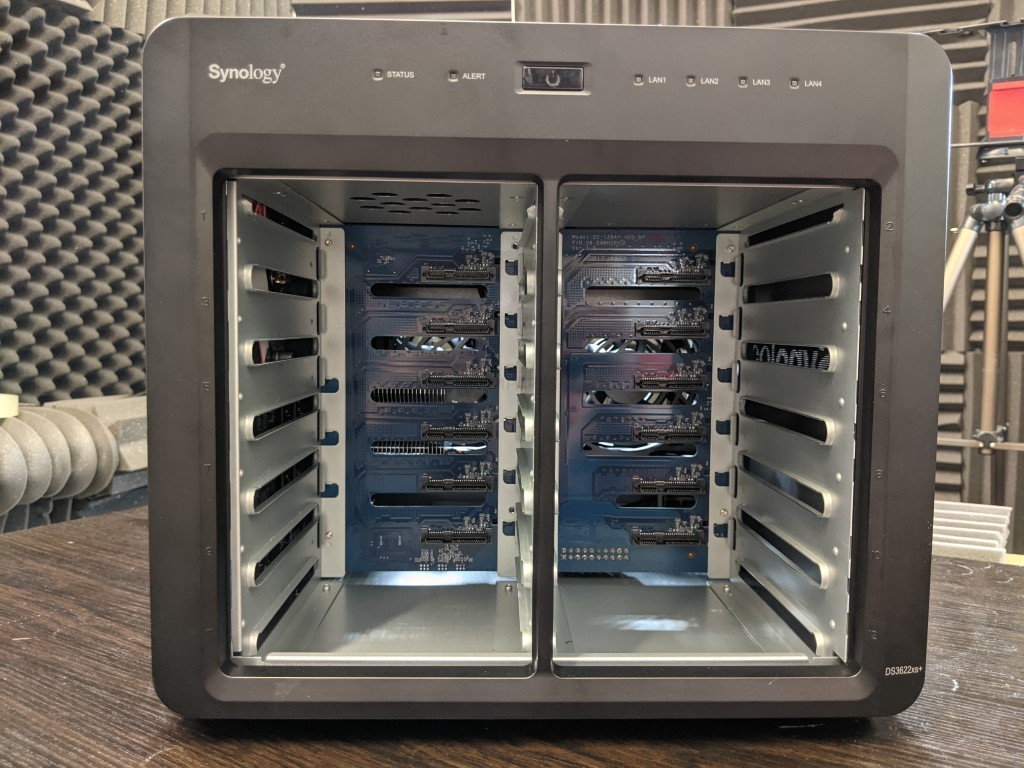
Removing all the stays shows that all 12x SATA connectors are all combined data/power as you would expect. I did wonder, given the launch of Synology HAS5300 SAS Hard drives two months or so ago, that the next generation of this enterprise 12-Bay would factor in combined SATA/SAS connectors, but I guess the PCI lanes of this XEON were already fairly well spread and am much happier with the two 10G and PCIe 3×8 slot instead (if there WAS a choice there with resource architecture).
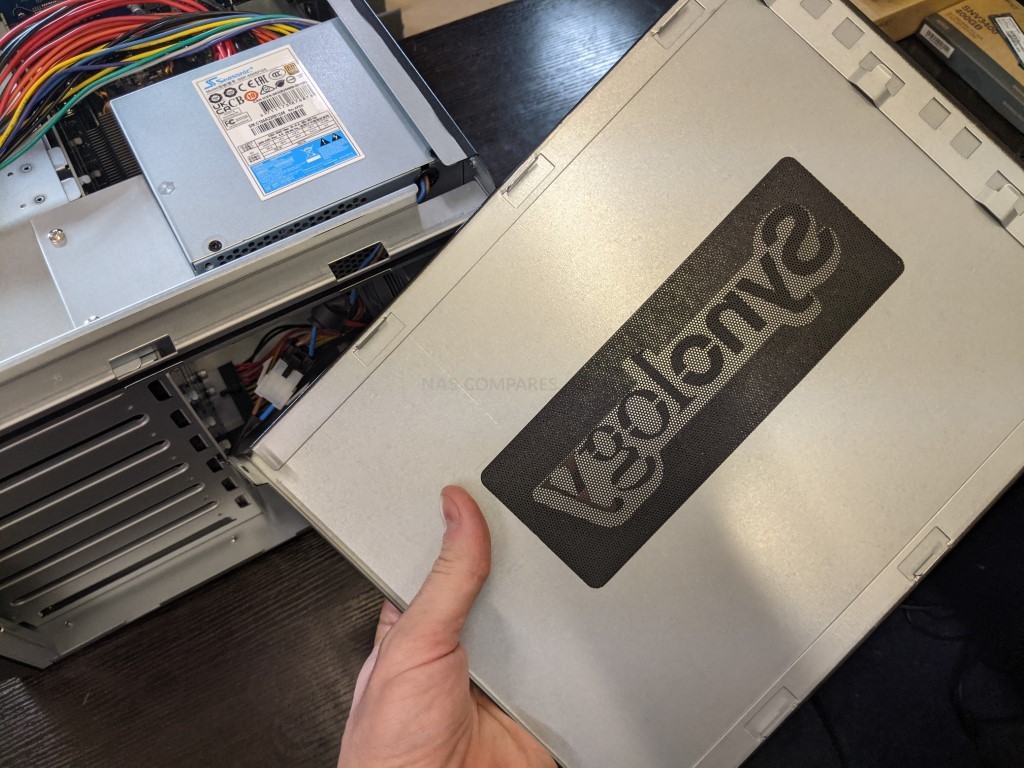
The DS3622xs+ NAS also features the neat and well-branded Synology ventilated/mesh logos on either side. Speaking as someone who has deployed a few Synology NAS solutions personally and professionally over the years, I can say these vents capture a lot more dust than you might expect and definitely help to assist passive airflow internally and assist dissipation. it is one of those slick design points that Synology are fond of,
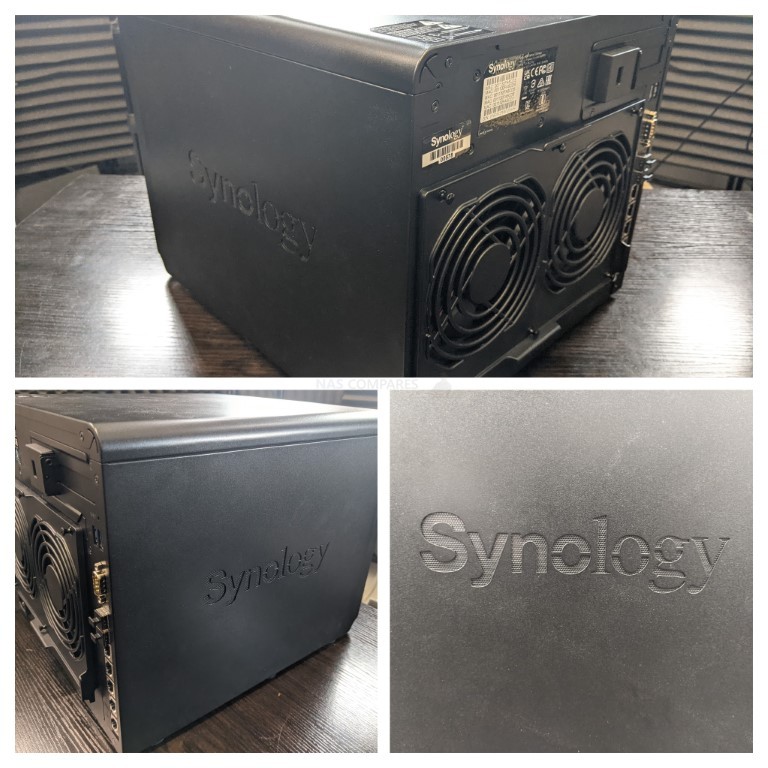
The physical design of the DS3622xs+ is largely unchanged since the DS3617xs and DS2419+ that came before it, but that is no bad thing. It manages to balance large storage potential vs compact deployment, as well as maintaining that Synology branded modern design. The lack fo a front-mounted USB is a bit odd, given the numerous convenient advantage this would provide, but it’s a minor gripe and given that this NAS is designed with remote/out-of-office deployment in mind, it’s not a big loss. Let’s talk about the connectivity and accessibility of the DS3622xs+ NAS and how it will provide physical access to your data.
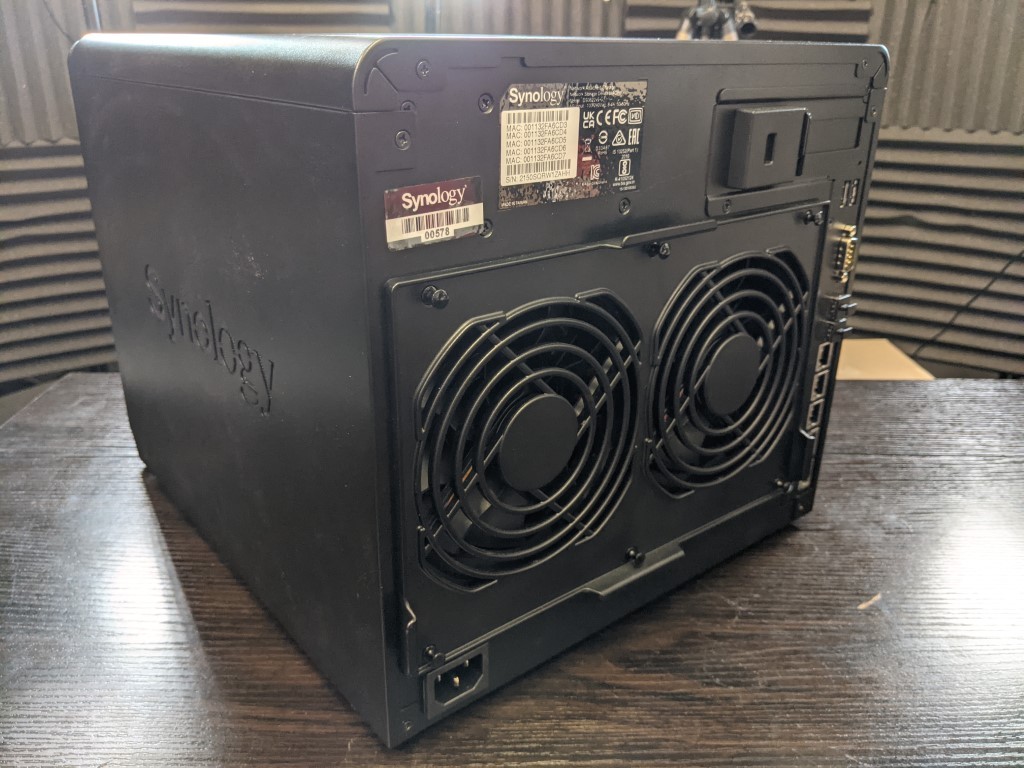
Synology DS3622xs+ NAS Review – Ports and Connections
I don’t think it would be an overstatement to say that the DS3622xs+ is easily the most well-provisioned Synology Diskstation NAS in terms of ports and connectivity that the brand has ever produced. When it comes to balancing the external connectivity of a NAS, there is a fine line that needs to be balanced between providing enough external bandwidth to let the internal storage media spread its wings a bit and saturate multiple connected clients with data throughput. For the most part, the DS3622xs+ absolutely and positively SMASHES IT and provides an unparalleled level of bandwidth on day 1 and in expandability.
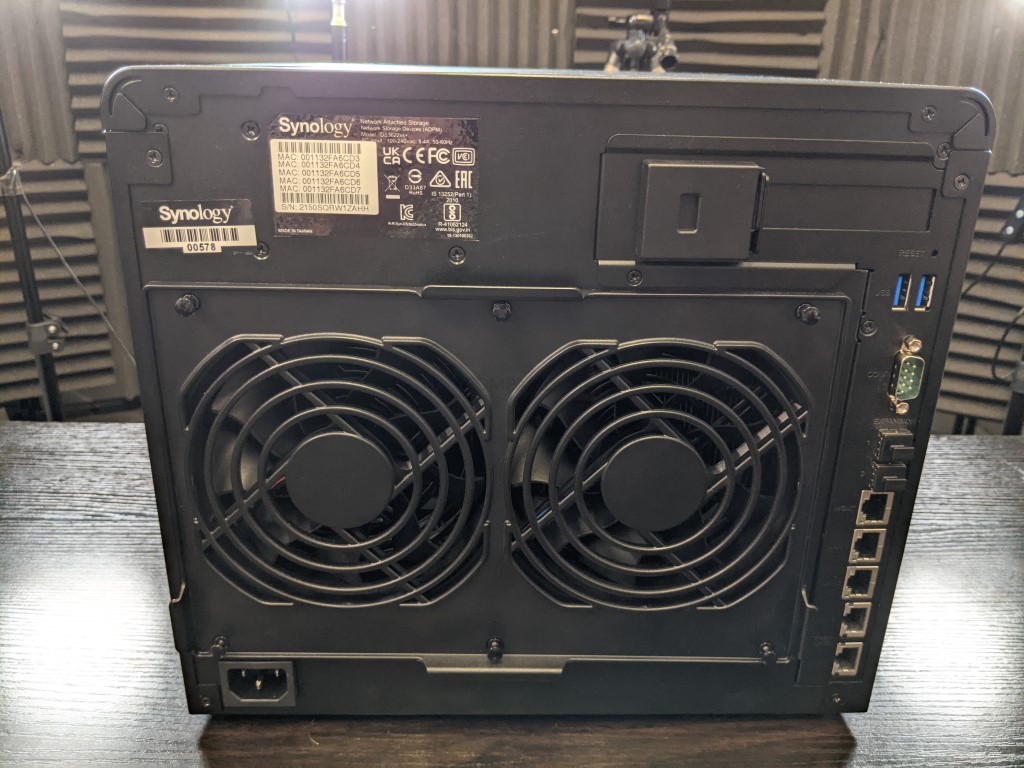
The two rear fans on the DS3322xs+ are 120mm in diameter each and can be fully controlled in the DSM control panel or left to automatically adjust as needed to maintain optimal system efficiency. Drawing air over the multiple heatsinks and storage bays inside, these fans are also not the quietest either. This isn’t a huge surprise, given the scale of the chassis they are ventilating though.
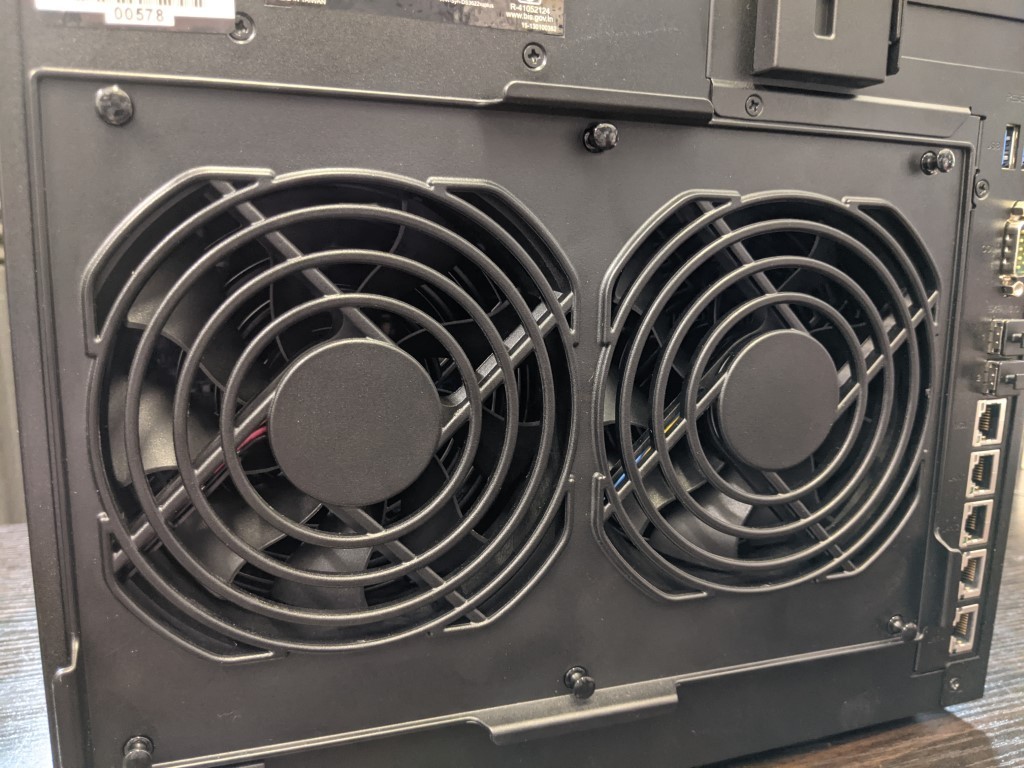
This rear panel can also be removed by pulling the 6 thumb pins on the rear of the chassis and this allows you to perform cleaning as needed. This is something that you would usually find on rackmount solutions, but welcome addition, given the scale of the storage available in this 12 bay solution. Likewise, the same goes for those logo branded side panels. which can also be removed for cleaning (as well as accessing some upgrade areas of the device).
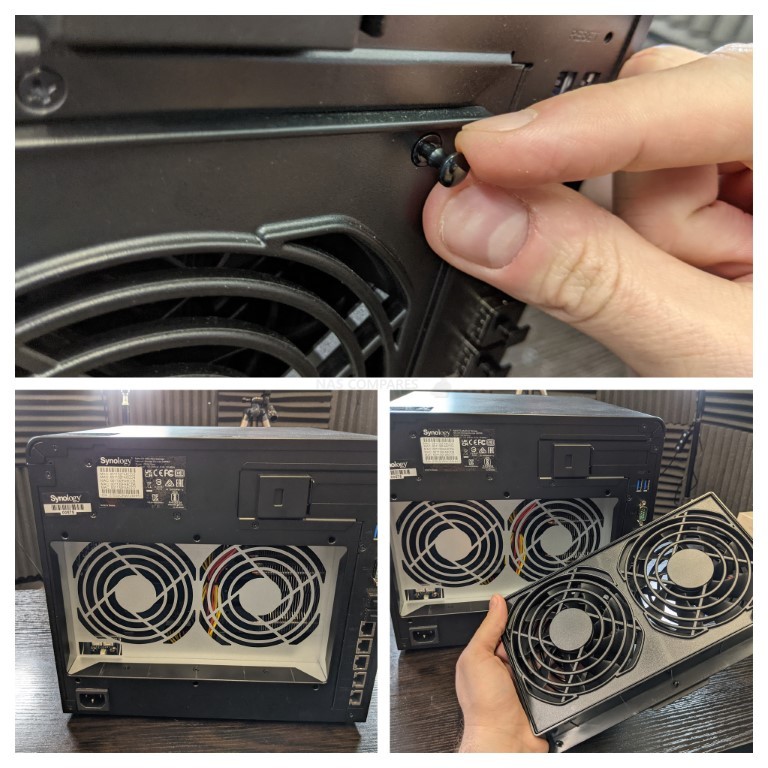
One of the biggest improvements of this device over the DS3617xs that came 4-5 years before it is the addition of TWO copper/RJ45 10GbE network ports on the DS3622xs+. These 10GBASE-T connections are exactly what buyers have been demanding in the high end of Synology’s Diskstation solutions for years now and although there have been a few desktop 10GbE solutions in their portfolio, they have always arrived with a whiff of compromise or arriving with nowhere near the mass storage potential that this 12-Bay solution can offer. Not only in those 12-Bays, but also with featured expansions adding more storage media.
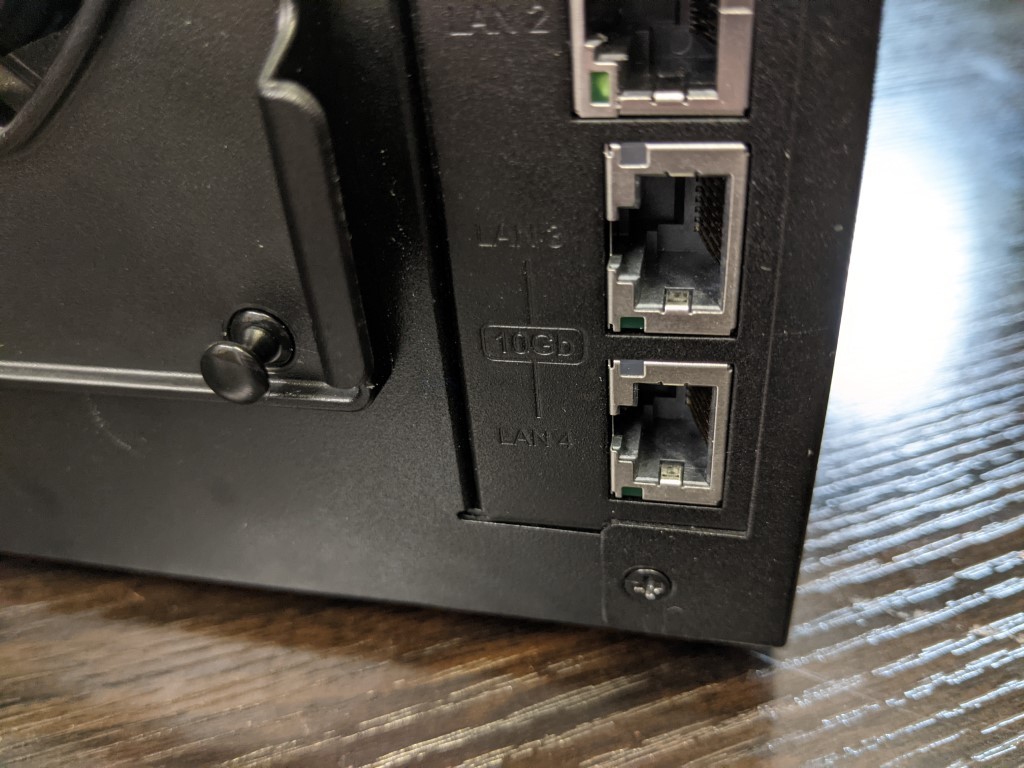
Unsurprisingly, these two 10G ports can be link aggregated/trucked to allow a possible 20Gb/s (2,000MB/s+) bandwidth connectivity – something that 12 Bays of enterprise-level storage media certainly has the potential to do. Add to that the PCIe upgrade slot (will touch on that in a bit) in conjunction with Synology’ range of 10Gbe upgrade cards, Combo 10G+Cache card and recently released fibre channel (FC) cards and you have some SERIES external bandwidth potential and saturation possible here – especially if you factor in the Synology SAT5200 SSD series. Below is the reported performance of the Synology DS3622xs+, fully populated with SAT5200 SSDs and an additional 2x 10GbE network card (2 slides, featuring RAID 5 and RAID 6):
Sequential performance was rated at 4,720MB/s read and 2,621MB/s write in RAID 5. Then you have the random 4K IOPS benchmarks, with the same fully populated SSD, 4x 10GbE and RAID /RAID6 setup. This reached highs of 262K Read in RAID 5.
Of course, this is a maximum level setup that required an additional PCIe upgrade card and full SSD population, however, even with the HAT5300 HDDs, you will likely comfortably saturate the available twin 10GbE ports available by default. Along with these, the DS3622xs+ also arrives with two regular 1GbE ethernet ports. Although these seem a tad unnecessary after the two previously mentioned ports, even a mid-level deployment of this NAS will mean you do not want to waste the higher bandwidth ports on regular less-than-gigabit internet connectivity and these ports still have their uses for low priority connectivity.
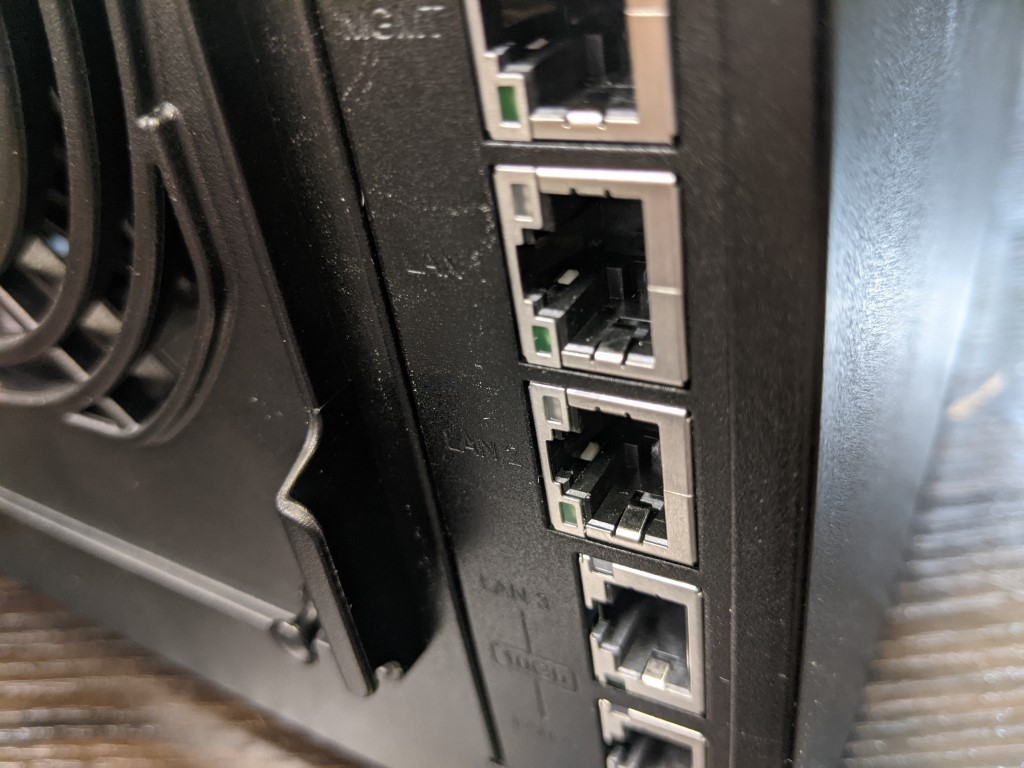
Interesting, the Synology DS3622xs+ also arrives with a further 100MB/s copper network port, however, this one is a relatively new inclusion to the Synology NAS hardware portfolio and is a much more useful alternative to the coms port usual found on this product series.
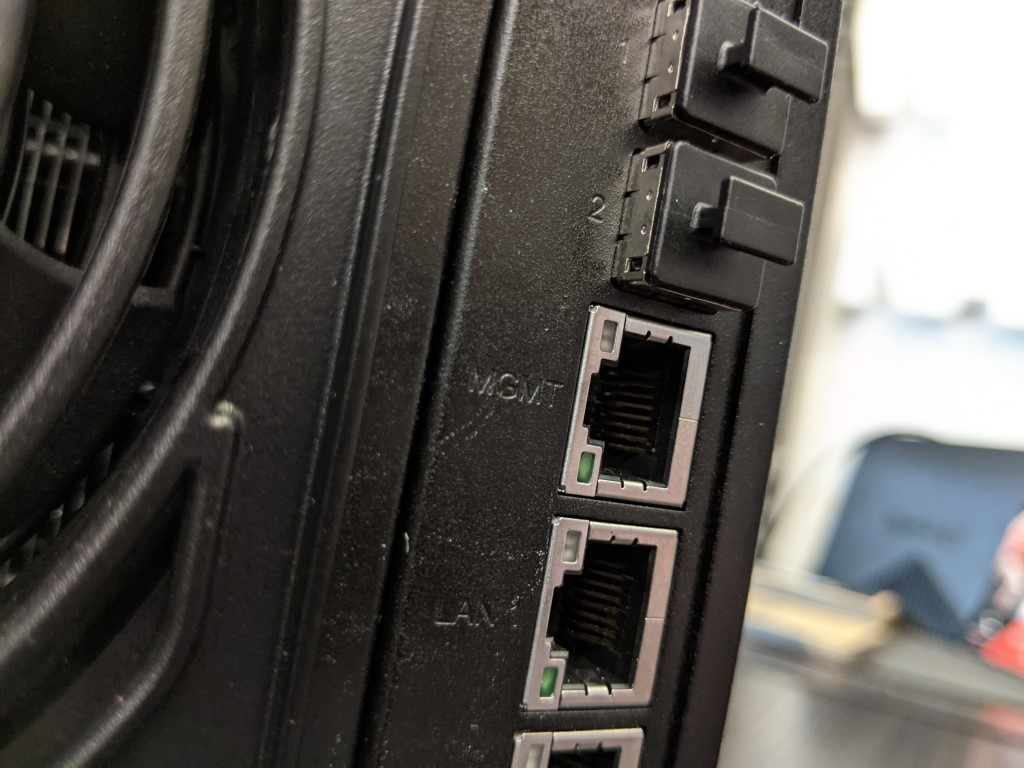
This additional network port provides a direct maintenance and control access point (with usual security and access control as usual) known as Out of Bands management (OOB). In the event that you have a critical network failure and need to interface with the system directly (even remotely when set up correctly) this is a useful recovery point for those that need to get into the system ‘around’ the existing network protocol in the event of connection difficulties to make repairs internally. Interfacing directly with the NAS directly via an RJ45 point-to-point connection is not new, but not in a way that would simplify the troubleshooting and management of powered-down devices remotely and accessing critical logs through a dedicated interface. It’s going to be a fairly rarely used feature I imagine, but kudos to them for including it as an extra and not expecting you to lose one of the existing ports to this access point. Talking of access points, let’s talk about another way in which you can scale up the DS3622xs+ in the system’s lifespan, that PCIe slot.
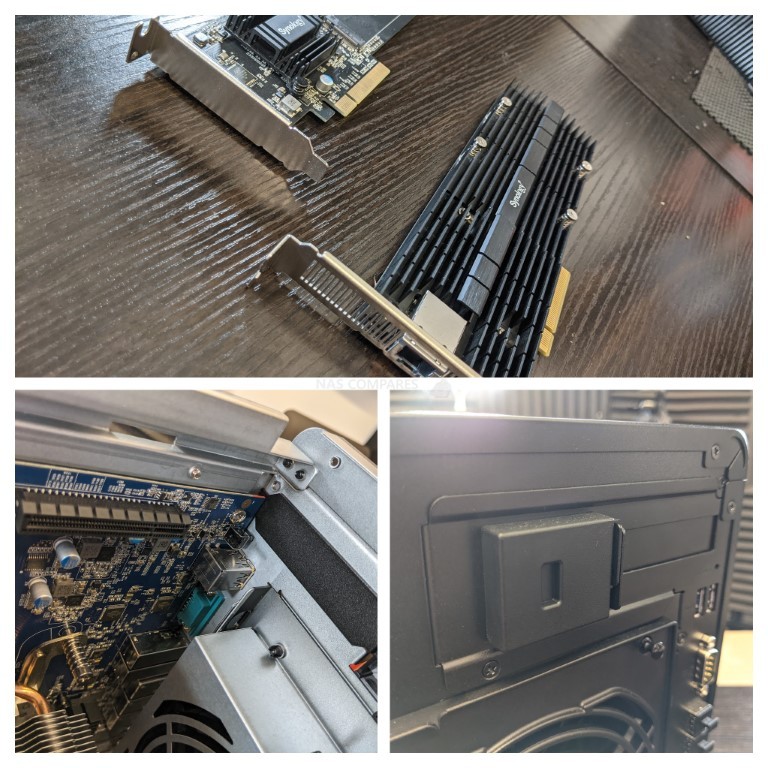
The DS3622xs+, like many of the enterprise and business class NAS solutions in Synology’s portfolio, arrives with a PCIe upgrade slot that allows you in upgrade the system with numerous internal and external performance expansion cards. This range quite extensively from single/twin port 10G cards (copper and fibre) and m.2 NVMe SSD caching cards to Combination cards that carry both features and a 25GbE two-port card. One impressive thing that Synology has managed in their upgrade cards and last 2-2.5 years of solutions is to ensure that ALL cards are PCIe Gen 3 x8 in architecture AND the slots on all their upgradable PLUS, XS, SA and FS systems are ALL PCIe Gen 3 x8 too. This means that no card will ever be throttled or bottlenecked by the PCIe slot and the potential 8000MB/s possible bandwidth allows you to push as much performance through as possible. Installation of cards requires the removal of one of the side panels (held in place by a couple of screws) and is a very straightforward installation.
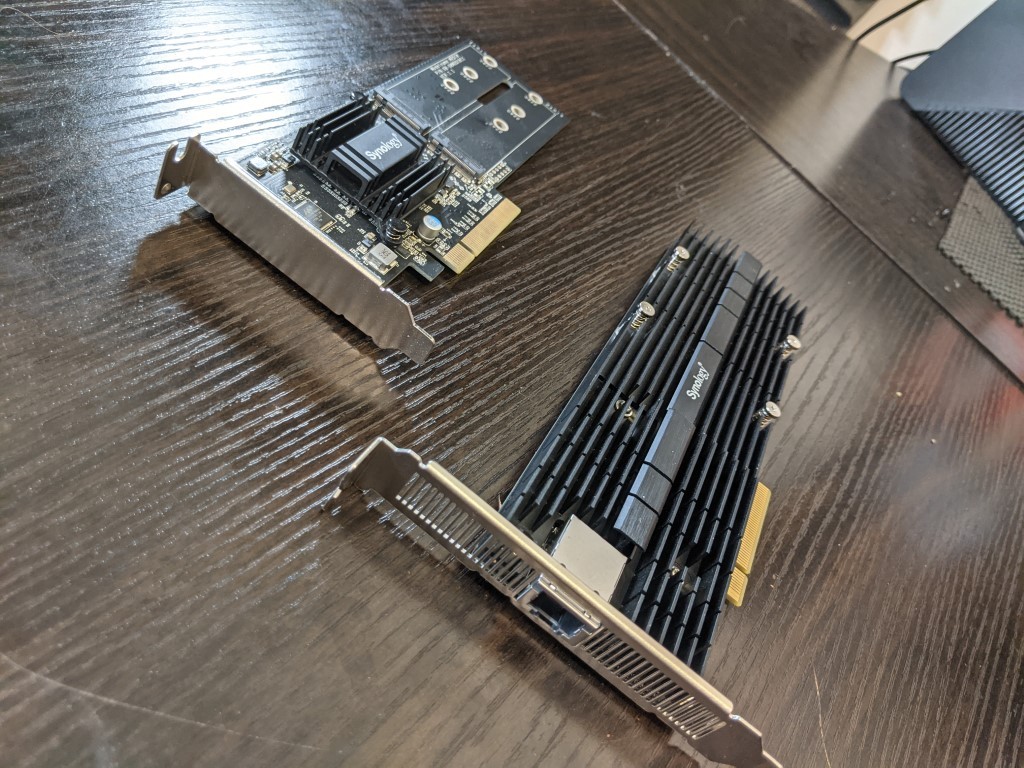
Though it is also worth noting that, much like the compatibility list of hard drives and SSDs, the supported compatible network upgrade cards list on the official site is heavy first-party focused (though with a little more flexibility this time around). See below:
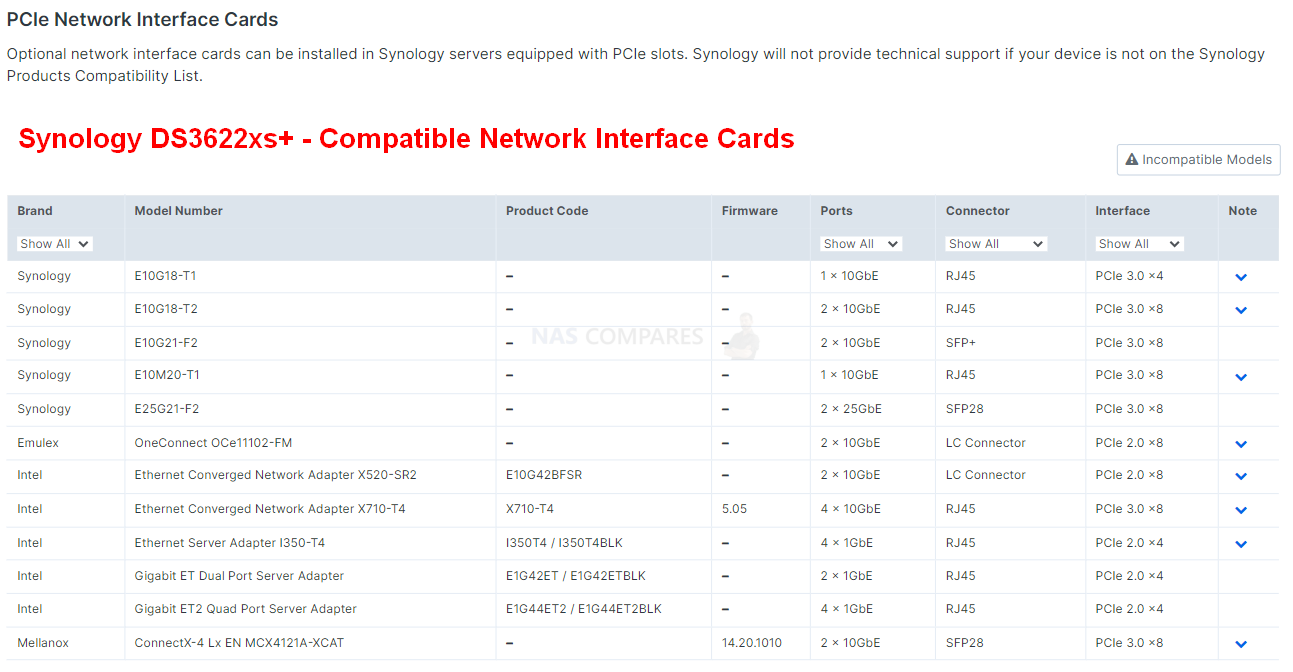
The final connections available are two of the best and (arguably) two of the worst. Let’s go upwards. The USB ports on the DS3622xs+ are a little bit of a disappointment for a few reasons. Firstly, Synology scaled back a lot of the abilities of USB ports in recent years and although standard external HDD/SSDs can be connected, along with UPS’ and a few encryption key devices, they have dropped the support of USB dongles, USB printers and Scanners. Although utility of most of these has reduced over the years, it has largely reduced the use of these ports. Add to that the fact that these ports are USB 3.2 Gen 1 (5Gb/s) Type-A, when USB 3.2 Gen 2 (10Gb/s) (in Type A and C) is available practically everywhere else and the idea of using these ports as any means of creating a local back of this 12-Bay particularly quickly are significantly reduced. It is certainly better to have these than no ports at all, but they are a little bit of a letdown when you look at how much the rest of the system has been upscaled since its predecessor.
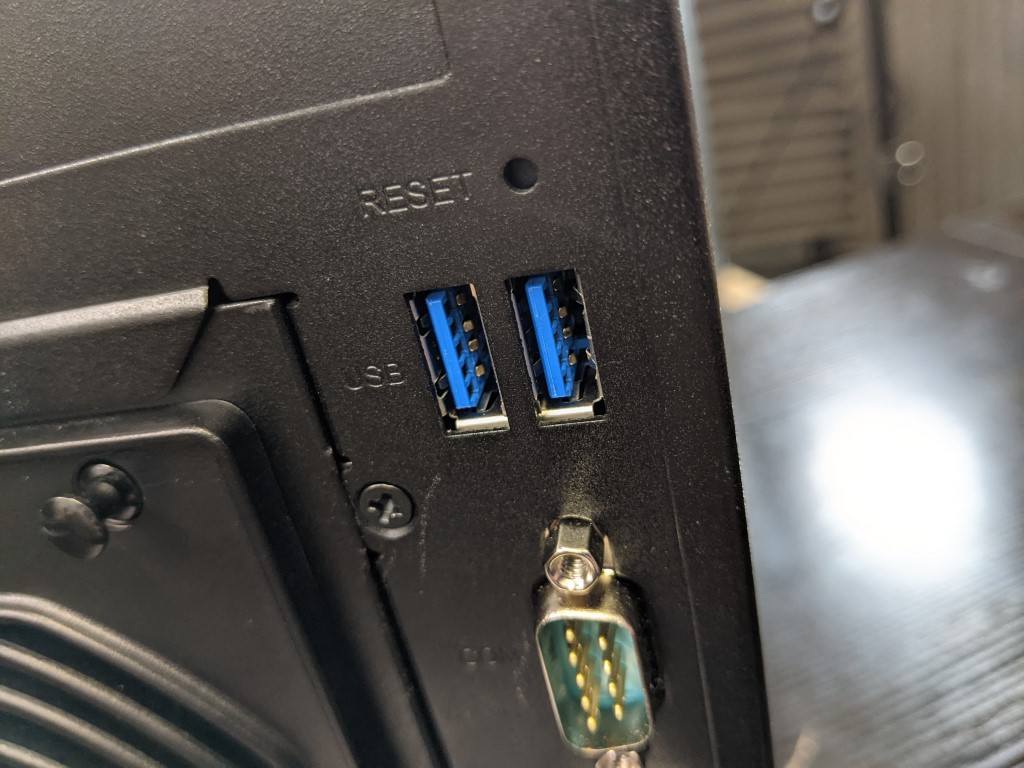
On the other hand, the inclusion of two expansion ports on the DS3622xs+ is definitely something I can get behind! The DS3622xs+ is not the first 12 bay desktop solution that has been produced (going back practically a decade now since the DS3612xs), with this new NAS also supporting a newer gen 12-Bay expansion (the DX1222) and allows you to have up to a possible 36 bays of storage. This is especially useful when you factor in that the DS3622xs+ has both those 10GbE network ports AND a PCIe upgrade slot to add even more. Therefore the potential to get the most out of so many bays of storage in terms of capacity AND in performance is highly possible in this NAS.
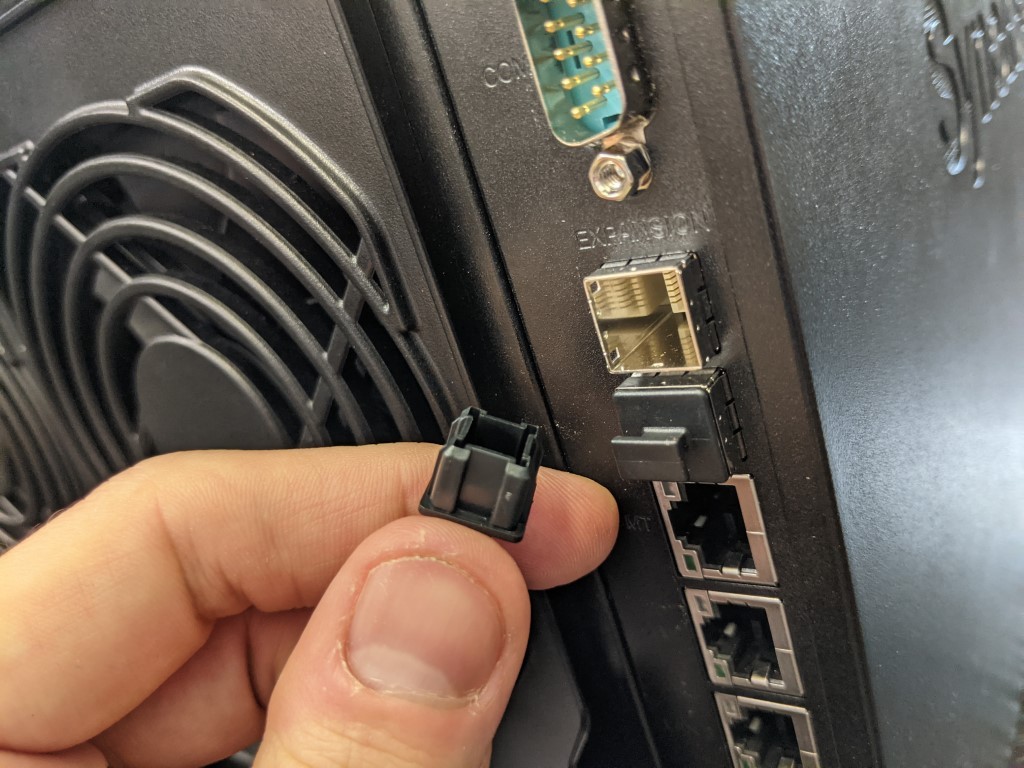
Despite the lack of SHR (Synology Hybird RAID) support on this box, that does restrict you from expanding your existing RAID pool and volumes over multiple chassis (thereby allowing you to increase the available storage capacity without needing to change/adapt your existing shares/targeted LUNs/VM directories/camera feeds). Although I would largely recommend not to spread your RAID outside of a single chassis, having that option can be useful to some and if not, you can always use the expansion(s) to create huge volumes that are connected eternally, but fully accessible via DSM and your existing network clients.
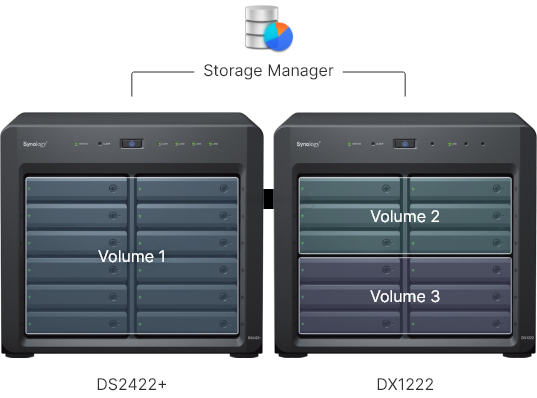
So, as you can see, the DS3622xs+ is a particularly impressive and unique NAS in terms of external connectivity and upgradability, far surpassing taht of its predecessor (the DS3617xs) and pretty much any other desktop NAS solution in Synology’s portfolio. Let’s discuss the internal hardware.
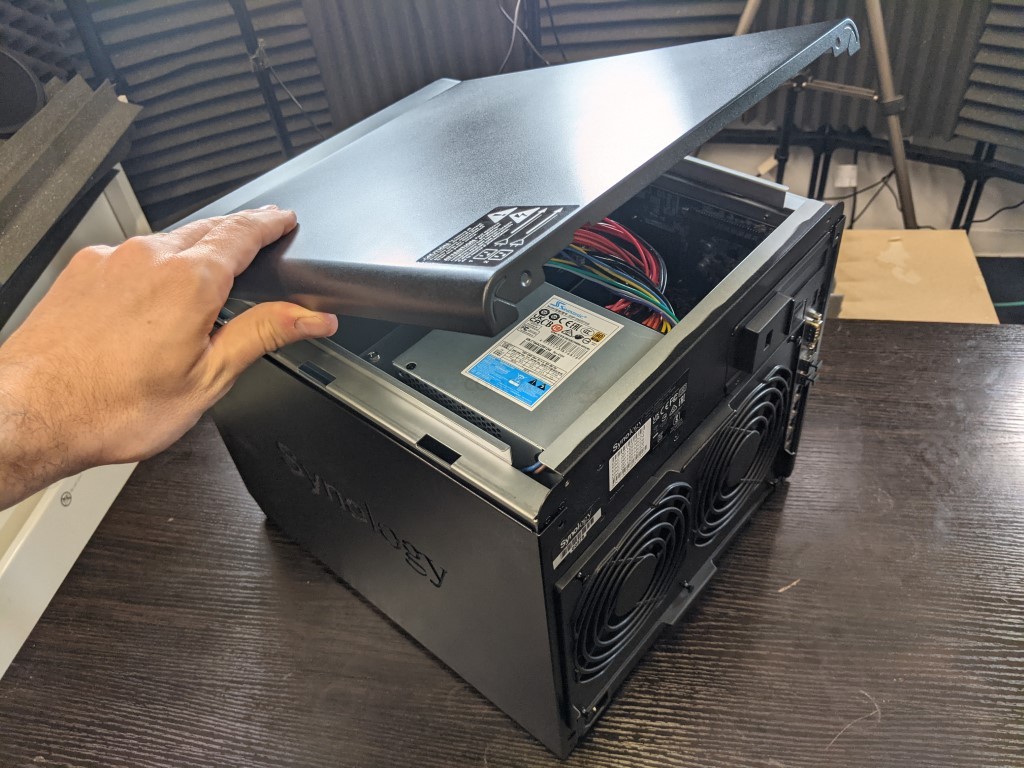
Synology DS3622xs+ NAS Review – Internal Hardware
The internal hardware of the Synolgoy DS3622xs+ is something that, for the most part, leave me impressed. It is not a HUGE jump up from the DS3617xs that came before it, with this new NAS system staying within the same CPU family series and just notching it up a few inches really. One early down point I noted was that the DS3622xs+ does not feature NVMe SSD m.2 bays inside (relying on upgrading towards this with the M2D20 or E10M20-T1 optional upgrade cards). Now, this could easily be the result of PCI lanes on the CPU and chipset being exhausted to support those 10Gbe ports, numerous bays and external HD mini-SAS architecture expansion slots. It is easy to imagine that adding m.2 slots on top of this was either an impossibility or would have resulted in capped/bottlenecked throughput on those m.2 slots. Nevertheless, this is a real shame, given the huge push that Synology has made on NVMe SSD caching on their systems and this would have been particularly advantageous to the end-users on a 12-Bay and 2x10G system that has the internal/external bandwidth potential to show the difference that caching could bring to multiple users at once. That said, let’s focus on the hardware inside that is present. Removing the first side panel reveals the memory of the DS3622xs+
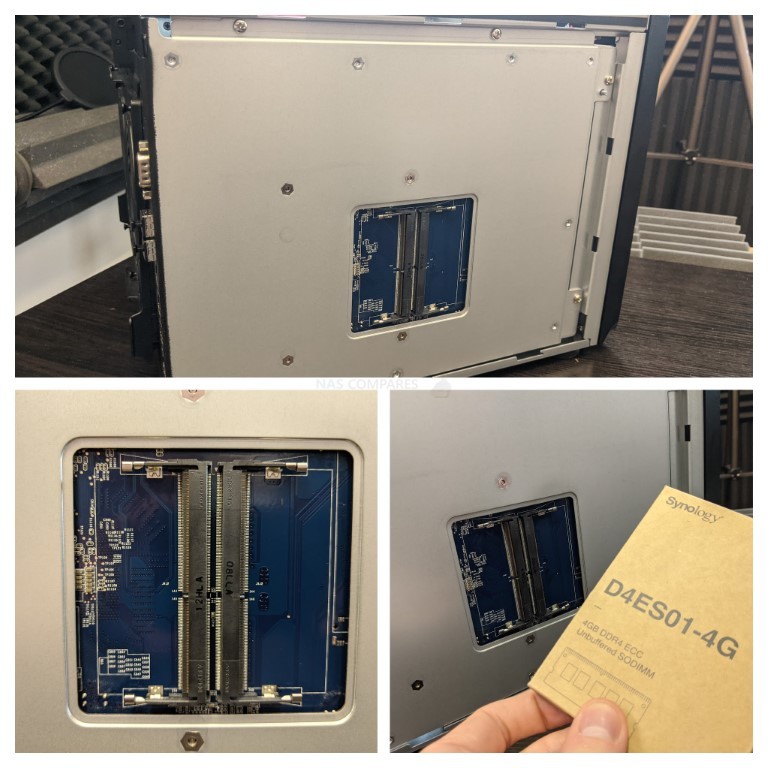
Now, it is worth mentioning that these two revealed SODIMM DDR4 memory slots are not actually the default memory of the DS3622xs+ NAS. These slots allow you to increase the default 16GB of ECC DDR4 memory to 48GB. As good as this sounds, it does require a couple of notes to be aware of. First off, the CPU inside the DS3622xs+ can actually support more than 48GB of memory and, in fact, the 48GB maximum memory on this NAS is the result of the default memory being located in a largely inaccessible slot (so they cannot be changed out for larger modules). Additionally, it is also worth remembering that Synology insist on the use of only their own branded DDR4 ECC memory inside the DS3622xs+ NAS and using alternative memory modules/brands can result in them being unable to support your warranty. This has always been a sore point for some in the smaller NAS products, but at this storage level, many business users are perfectly fine with this.
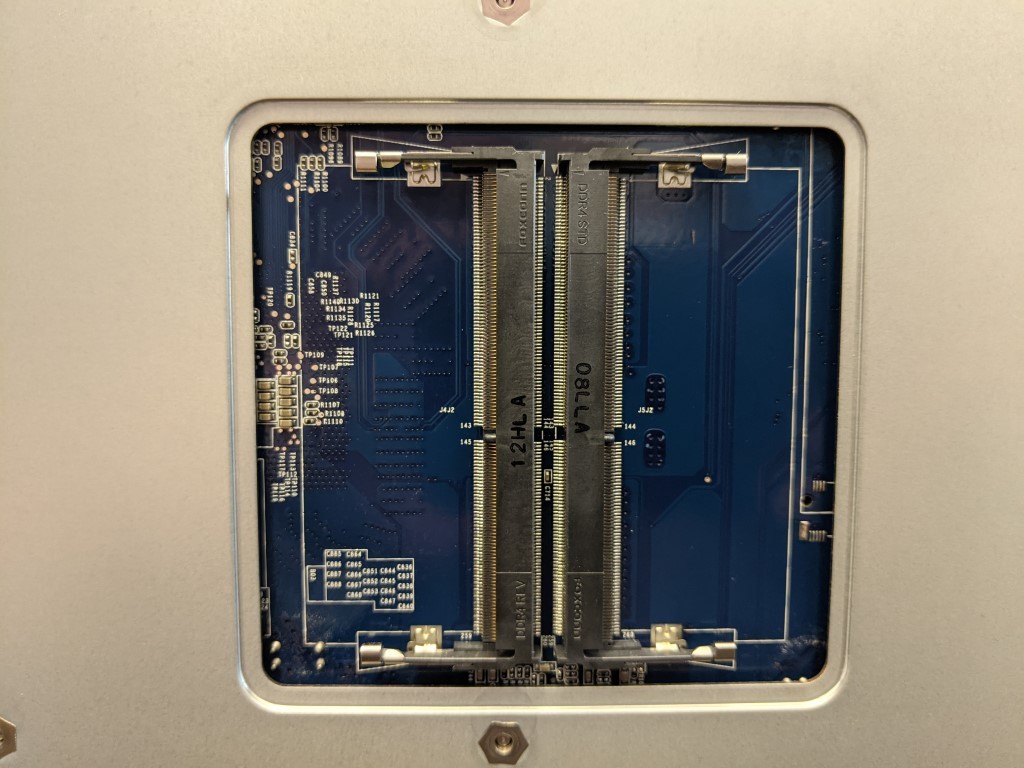
The default 16GB of memory is located next to the XEON processor inside and is installed in two SODIMM slots that are impossible to reach without fully dismantling the entire NAS. The 16GB arrives in 2x 8GB Synology DDR4 2400Mhz ECC modules. Synology has always used Error Correcting Code memory in their SMB level units and higher and it is exactly the quality of memory I would expect in an enterprise product from this brand.
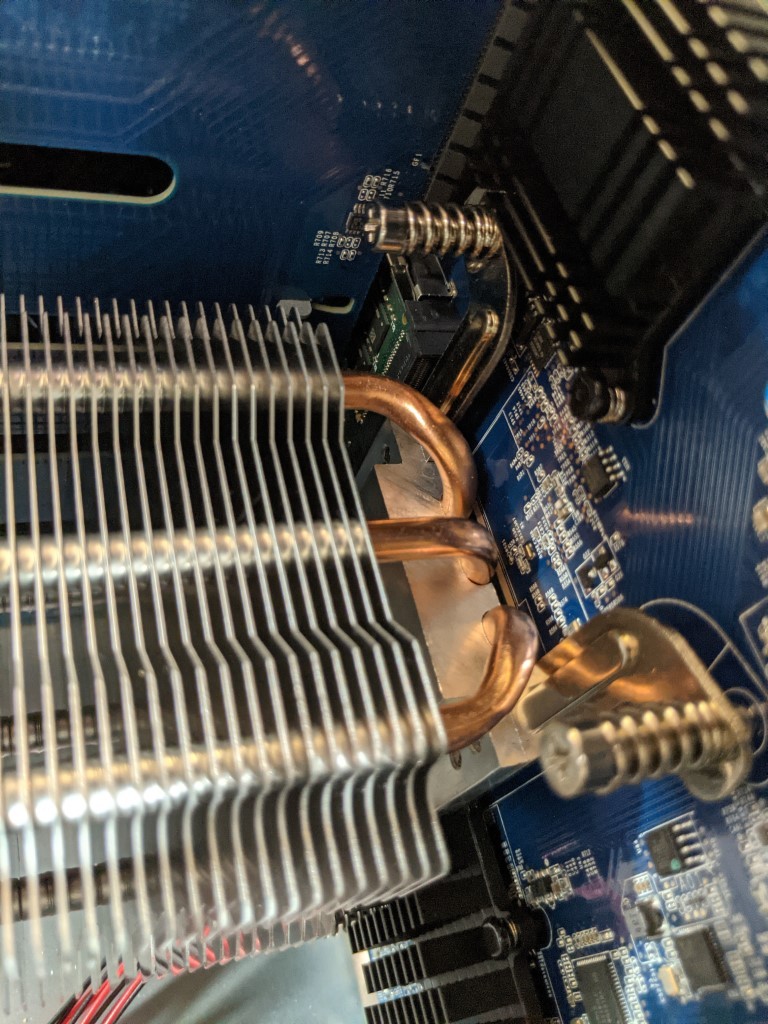
Removing the top panel reveals the access to that PCIe upgrade slot, but also a better view of the internal ventilation of the DS3622xs+. You can see that the 12 bays of storage are all fed into their own multi-ported controller board and this board feeds into the main CPU+memory controller board via its own PCIe connector. Indeed, this is a very clean setup and although the power cabling for the 550W PSU is visible, it is neatly tied and controlled. Despite a large amount of storage and a rather compact chassis, there is a tonne of airflow available to those big rear fans.
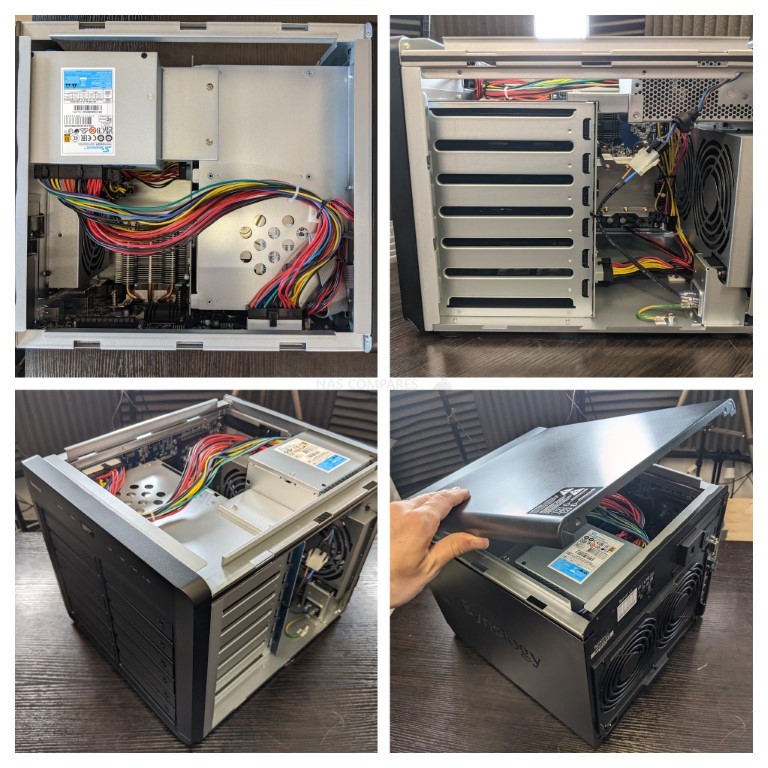
Indeed the entire outer chassis of the DS3622xs+ can be removed in 3 separate panels. This can be done for reasons of maintenance, but also for when you need to upgrade certain components. The CPU on the DS3622xs+ is not upgradable, but this kind of easy access is going to make keeping things dust-free/clear considerably easier long term. It is a feature that has existed in the 12 bay series of NAS solutions for more than a decade.
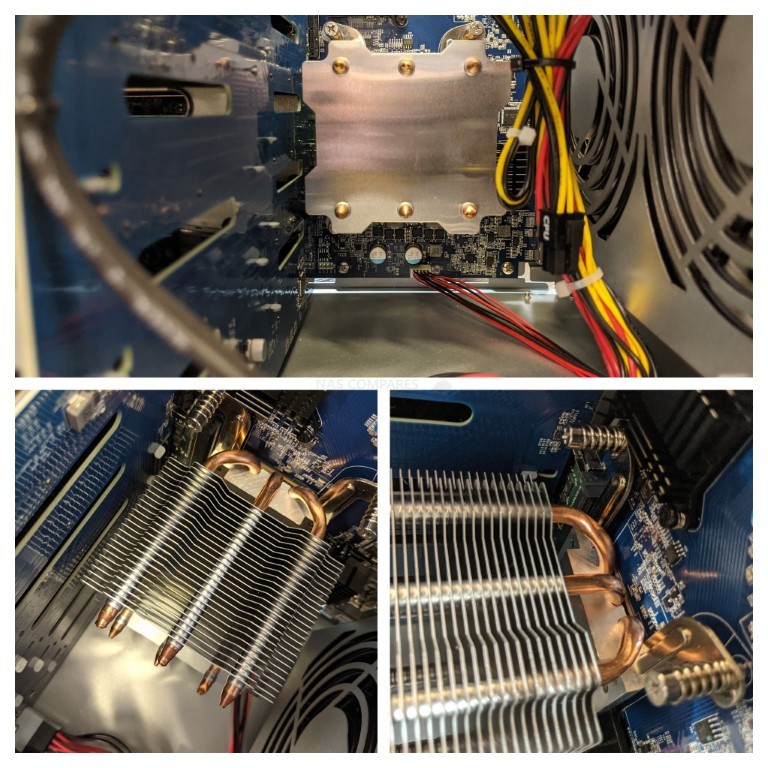
The CPU and its fanless heatsink are surprisingly compact, located on the base of that central controller board. The CPU is an Intel 6-Core Xeon D-1531. Now, in of itself, this is a powerful CPU that is going to find a great balance between high throughput, power efficiency and multi-task handling in the hundreds or thousands. However, this is still a small jump up from the Xeon D-1527 4-Core processor that came in the 54-5 year older DS3617xs predecessor.
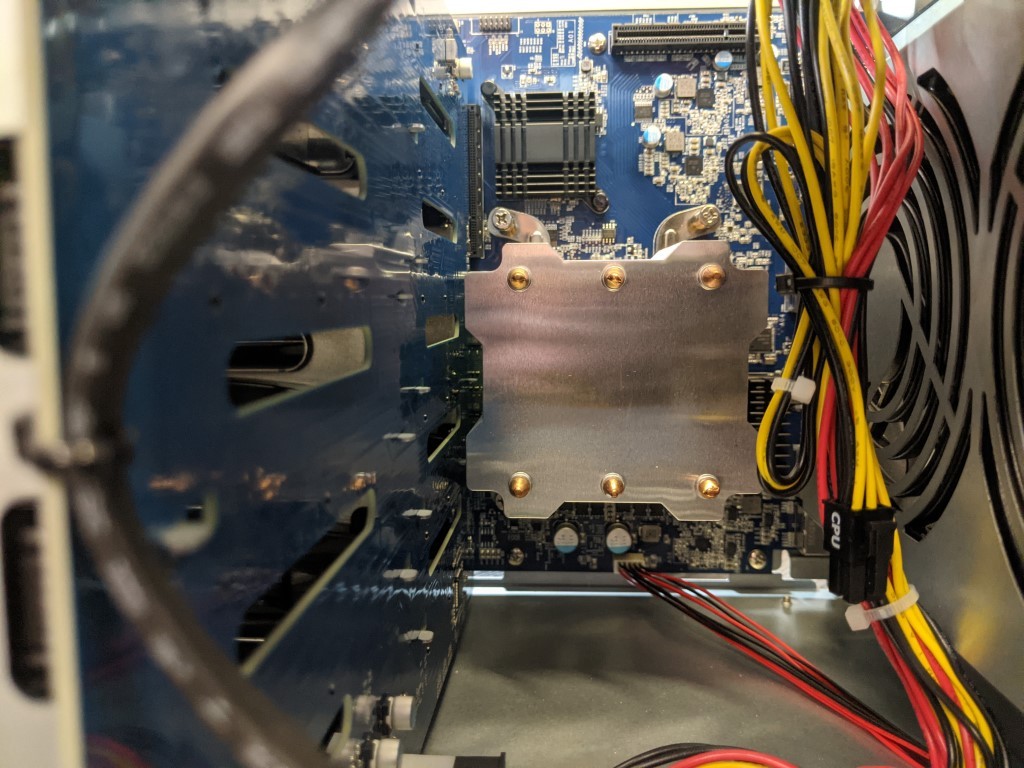
A close look at the specifications and details over on Intel for the new and old Xeon D series CPU shows you that they both have the same clock speed at the base and in turbo, both do not feature embedded graphics, both were released in 2015 and are incredibly similar architecture, though the D-1531 in the DS3622xs+ is still an improvement in a few areas.
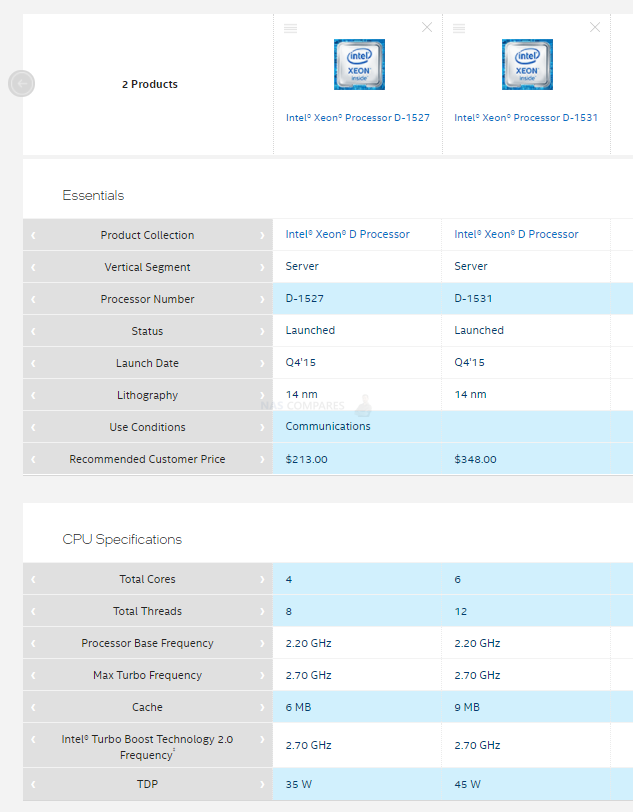
Where the Xeon D-1531 CPU in the DS3622xs+ improves over its predecessor is in smaller quality of life and ‘larger use’ areas that lower latency to connected users and when dealing with larger (in frequency and numerous) tasks. Aras such an the extra 2 cores, four more CPU threads to handle tasks and larger L2/L3 cache availability. Still, it would have been nice to see this CPU get the kind of upscale that we saw in the SA series, or even the 8-Core Intel Xeon D1541 that is available on the RS3621xs+ rackmount alternative to this desktop NAS.
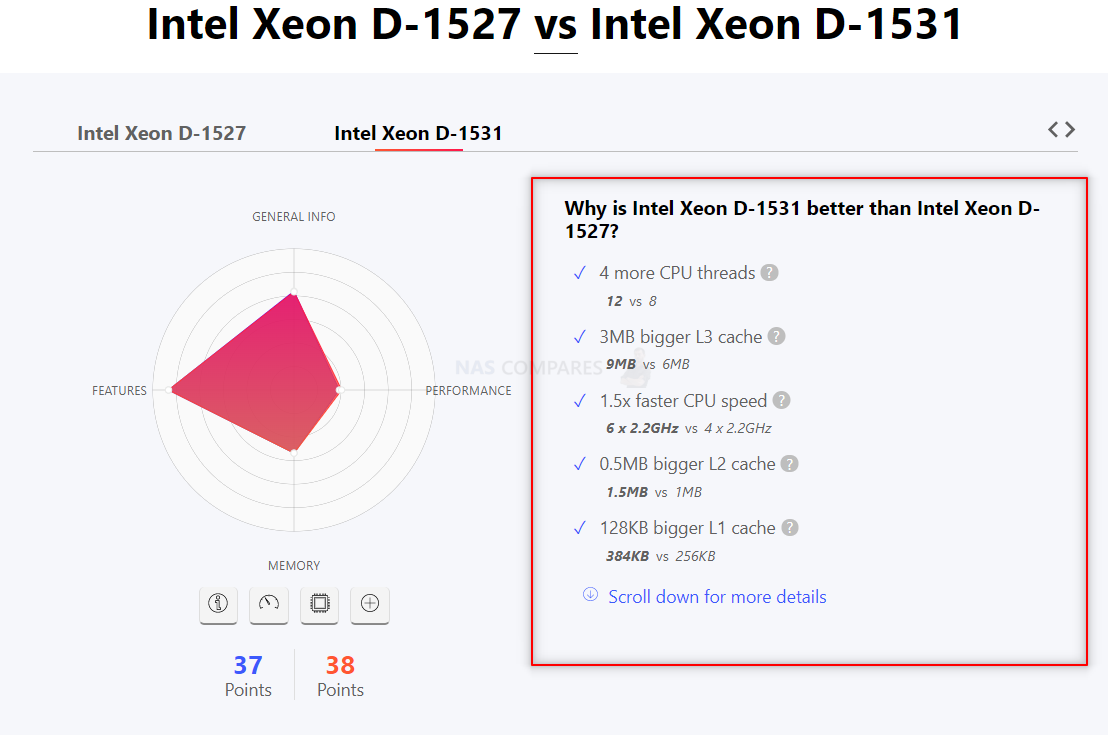
However, Synology has always been a brand that keeps a very watchful eye on its portfolio and how solutions sit next to each other, not only between each solution in the desktop series (making sure that there is little overlap), but also making sure that there is a clear price-point line between desktop and rackmount. Adding a more modern CPU may have led to the brand increasing the price of this solution significantly over its predecessor, whereas (ex.VAT) the DS3622xs+ is only a couple of hundred pounds more than the 4-5years older DS3617xs. Not to make excuses for the slightly underwhelming CPU (in context) but I can see why Synology went with this particular Xeon. Let’s talk about the software on the DS3622xs+, another big part of why buyers will be looking to install this NAS in their homes or business.
Synology DS3622xs+ NAS Review – Software and Services
Now, to cover the WHOLE Synology software and services that are included with the DS3622xs+ NAS would result in a review that is twice as long as this review so far! Synology’s Diskstation Manager software that comes with this device (either DSM 7 or DSM 6.2 depending on your preference) provides a massive arrangement of services, applications (first and third party supported) and a huge number of client applications for desktop, mobile, windows, mac and linux (as well as a bunch of other more home-based tools). These allow management and access to the data on the DS3622xs+ in very tailored ways, as well as the web browser-based access that has the appearance, intuitive design and responsiveness of a local operating system. The DSM interface can be accessed by hundreds of users at the same time (with each user having tailored access, rights and privileges). DSM is available with ALL Synology NAS and the depth and abilities of DSM on any NAS are dependant on the hardware architecture of the NAS itself. In the case of the Synology DS3622xs+, it supports practically EVERYTHING (with the exception of SHR, as previously mentioned). If you want to learn about the latest version of DSM 7 and the software and services that are included with the DS3622xs+ NAS, watch my FULL review below (alternatively, you can read the DSM 7 Full Review HERE):
As mentioned, the DS3622xs+ supports pretty much the entirety of the DSM 7 and DSM 6.2 applications and services. If you are an existing user of SaaS and PaaS (Software as a service and Platform as a service) from the likes of Google Workspace and Office 365, knowing that you can synchronize these systems or choose to export away from them onto the Synology services is going to be very appealing. Key business applications that are included with your NAS are:
Synology Office – Create documents, spreadsheets, and slides in a multi-user environment. Real-time synchronization and saving make collaboration a breeze.
Synology Chat – Aimed at businesses, Synology Chat is an IM service that transforms the way users collaborate and communicate.
Synology Drive – Host your own private cloud behind the safety of your NAS with 100% data ownership and no subscription fees.
Synology Moments – Manage your photos and videos with deep-learning algorithms that automatically group photos with similar faces, subjects, and places.
Synology Calendar – Stay on track, share calendars, and schedule meetings, while ensuring sensitive information remains safely stored on company premises.
Synology Active Backup for Business (ABB) – Consolidate backup tasks for virtualized environments, physical servers, and personal computers, and rapidly restore files, entire machines, or VMs – completely license free.
Synology Hyper Backup – backup you NAS safely and efficiently to multiple destinations with deduplication, integrity checks, compression, and versioning.
Synology Surveillance Station – Safeguard your business, home, and other valuable assets with reliable video surveillance tools.
Synology Virtual Machine Manager (VMM) – An intuitive hypervisor that supports Windows, Linux, and Virtual DSM virtual machines. Its powerful disaster recovery tools help users achieve maximum service uptime.
Synology High Availability – Synology High Availability (SHA) combines two Synology NAS servers into one active-passive high-availability cluster, alleviating service disruptions while mirroring data.
Synology Central Management System (CMS) – Synology CMS allows you to manage multiple Synology NAS servers quickly and conveniently from a single location.
Synology Video Station – Manage all your movies, TV shows, and home videos. Stream them to multiple devices or share them with friends and family.
Synology Photo Station – Built to help photographers manage their photos and share them with clients for feedback or business development.
Synology Audio Station – Manage your music collection, create personal playlists, stream them to your own devices, or share with family or friends.
Synology File Station – Manage your Synology NAS files remotely through web browsers or mobile devices.
You cannot really fault the software and services that are included with the Synology DS3622xs+ NAS, as you are going to get the very best experience available on the platform, thanks to the hardware and architecture of this NAS. DSM 7 is an every evolving platform, so if you are reading this now at the time of publishing or years later, there is always going to be something in DSM for everyone.
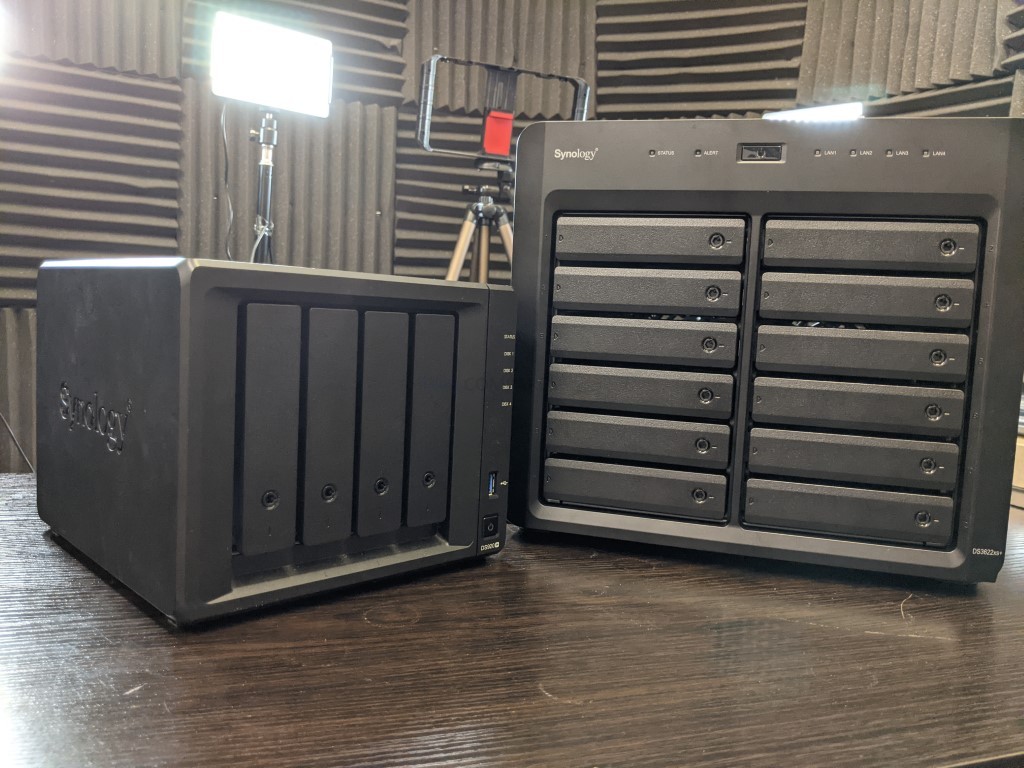
Synology DS3622xs+ NAS Review – Conclusion & Verdict
Unsurprisingly, the Synology DS3622xs+ is by FAR the most powerful and capable desktop NAS solution that the brand has ever produced – and that is not even a close-run thing. But we are still talking about a £2,500 box here (unpopulated) and you are going to expect that there is some serious horsepower here – So are you getting the most for your money here? Almost completely, yes. There are a few lingering things that some buyers will still not be in love with, such as the lack of M.2 caching bays, the lack of SAS support or the reduced support of 3rd party drive and network upgrade compatibility, but they do not undercut that this is a genuinely groundbreaking solution from Synology that provides the ultimate base to enjoy and make the most of the Synology DSM 7 platform in 2022 onwards. Once you breakdown everything included in this package, from DSMs software and services, to the tremendous bandwidth available here internally and externally, this compact tank-like NAS server is an absolute beast and a must for those that are keen on fully integrating a private cloud network and subscription-free SaaS-level setup across their company.
| UNIT | |
| Synology DS3622xs+ PROS | Synology DS3622xs+ CONS |
|
|
🔒 Join Inner Circle
Get an alert every time something gets added to this specific article!
This description contains links to Amazon. These links will take you to some of the products mentioned in today's content. As an Amazon Associate, I earn from qualifying purchases. Visit the NASCompares Deal Finder to find the best place to buy this device in your region, based on Service, Support and Reputation - Just Search for your NAS Drive in the Box Below
Need Advice on Data Storage from an Expert?
Finally, for free advice about your setup, just leave a message in the comments below here at NASCompares.com and we will get back to you. Need Help?
Where possible (and where appropriate) please provide as much information about your requirements, as then I can arrange the best answer and solution to your needs. Do not worry about your e-mail address being required, it will NOT be used in a mailing list and will NOT be used in any way other than to respond to your enquiry.
Need Help?
Where possible (and where appropriate) please provide as much information about your requirements, as then I can arrange the best answer and solution to your needs. Do not worry about your e-mail address being required, it will NOT be used in a mailing list and will NOT be used in any way other than to respond to your enquiry.

|
 |
UniFi Routers vs OpenWRT DIY Routers - Which Should You Choose?
WHY IS PLEX A BIT S#!t NOW? IS 2026 JELLYFIN TIME? (RAID Room)
Synology FS200T NAS is STILL COMING... But... WHY?
Gl.iNet vs UniFi Travel Routers - Which Should You Buy?
UnifyDrive UP6 Mobile NAS Review
UniFi Travel Router Tests - Aeroplane Sharing, WiFi Portals, Power Draw, Heat and More
Access content via Patreon or KO-FI





Discover more from NAS Compares
Subscribe to get the latest posts sent to your email.


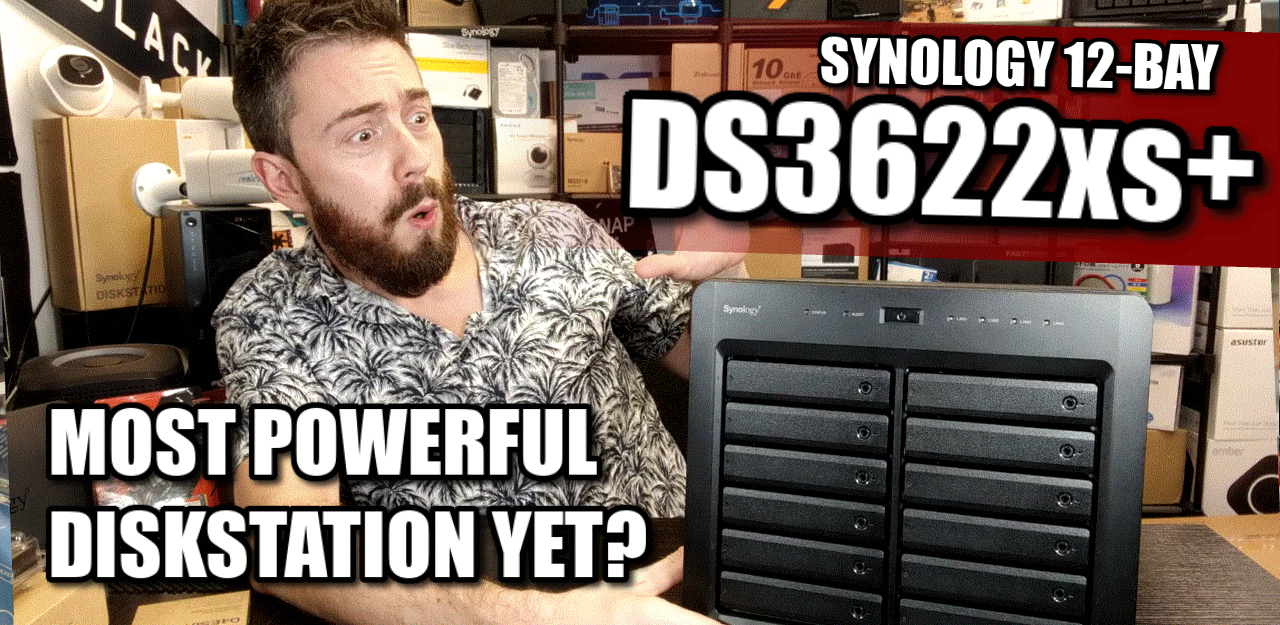
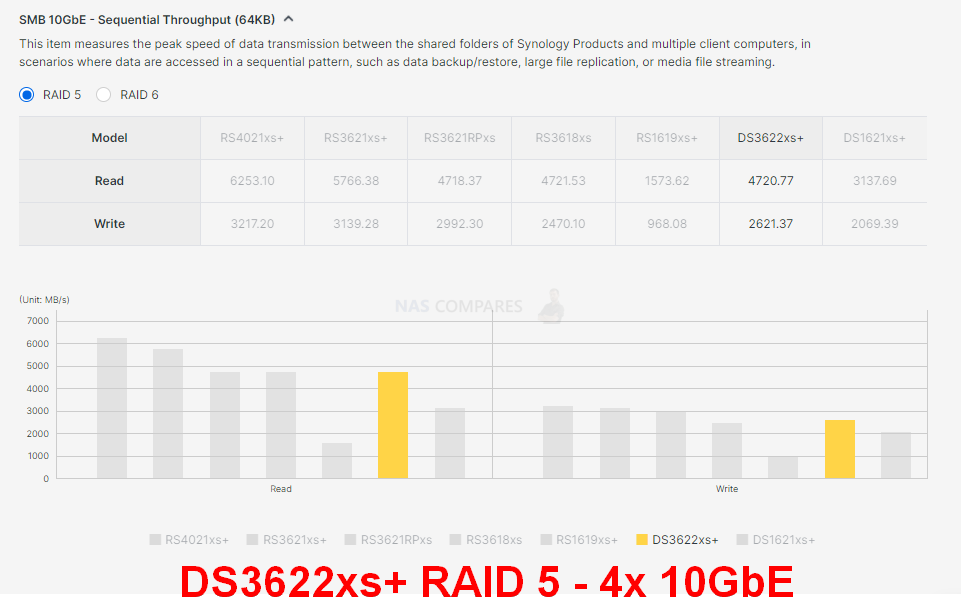
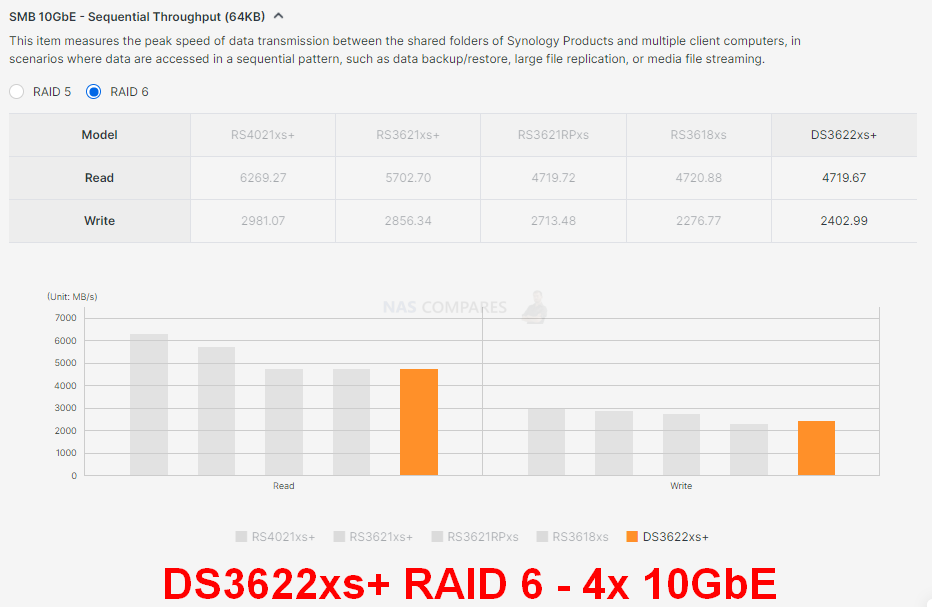
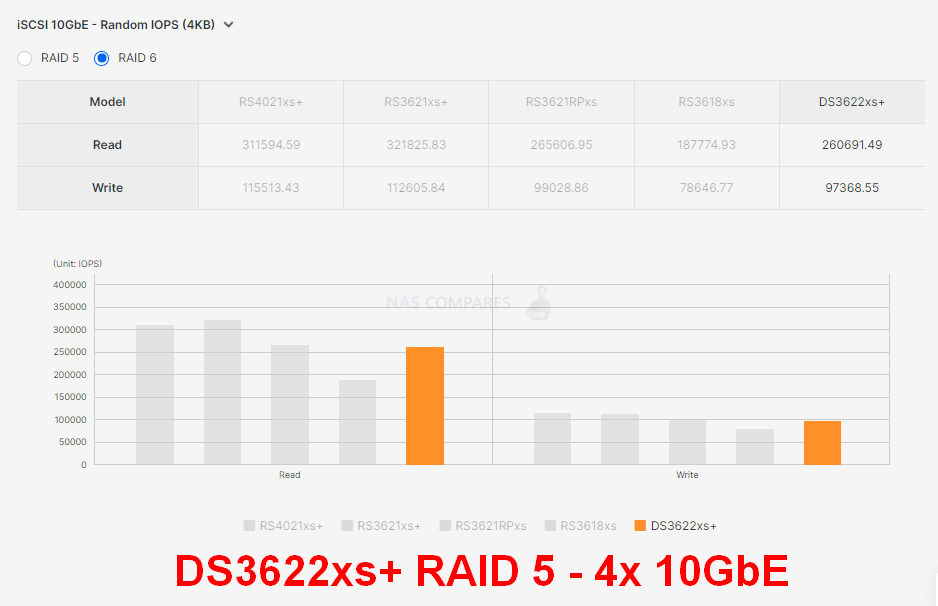
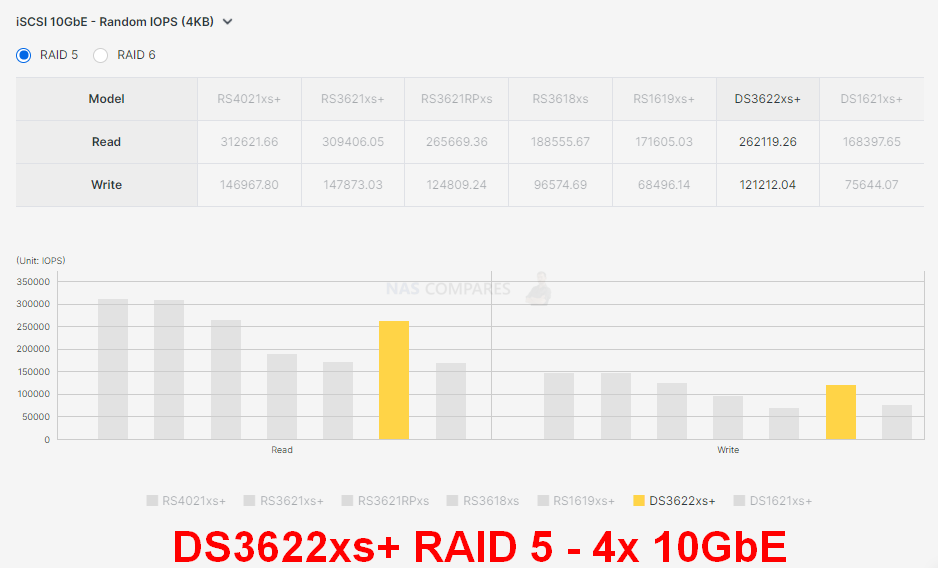




It’s time to acknowledge that not every NAS is intended for the hobbyist who might want to install Plex or Jellyfin or use whatever old hard drive they have at the bottom of a drawer somewhere. This is a really capable small business system, utterly wasted on the home user and priced accordingly.
REPLY ON YOUTUBE
i want tis nas
REPLY ON YOUTUBE
The DS3622XS+ does not support SHR… or does it? I migrated over a system from a DS1821+ to a 3622XS+ today and when prompted to migrate, I chose NOT to keep settings/configuration (you have 2 options in the migration assistant – keep files only, or keep files and configuration). The system came back up and is in SHR 1 configuration with no warnings about the SHR. It’s labeled as SHR-1 and everything… the thing is, I’m curious what will happen when I add another HDD… right now I’m in 8 of 12 bays, and I plan to max it out. I’m concerned that when I go to add the next HDD, I will be met with an error telling me I cannot go forward unless I convert to a more standard RAID configuration.
REPLY ON YOUTUBE
I’ve just found a linke that guides you to enable SHR support, and I’ve tested it on my DS1823xs+, and it worked! Share with you guys.
REPLY ON YOUTUBE
Thank you for this detailed overview
REPLY ON YOUTUBE
There seem to be a lot of questions about whether or not you could do this and THEN add drives to the SHR once it’s up-and-running on the DS1621xs+. I just tested this today for our @MacGeekGab podcast, and it definitely allows you to add new drives to the SHR, just like an SHR-supporting NAS would. No issues. Using DSM 7.2.1-69057 Update 4.
REPLY ON YOUTUBE
I wont buy a new Synology system as I have a lot of existing drives that I spent thousands of dollars on and if I cannot just move them over I am not buying the unit
REPLY ON YOUTUBE
Love the video!!!! It was really helpful! Keep up the great work!!!
REPLY ON YOUTUBE
I bought DS423+ after comparison reviews from your channel, and watched this video while still waiting for it to arrive. Great job! Is someone at the door? it’s my NAS arrived!
REPLY ON YOUTUBE
I’m only 7.11 into your review and something that hit me was your concern over no front access to USB port, my question would simply be :who says that has to be the front facing “face”, why do you need to be seeing that ; just turn it 180′ and have the ‘back’ as the front where you can get to all the ports……. I will now continue to watch your complete review.
REPLY ON YOUTUBE
Had this on in the background over a couple of days. This is the comment you requested — I made it to the end! =D
It’s definitely not in the budget for me yet, but I’m dreaming about a NAS in my setup in the future!
REPLY ON YOUTUBE
Does it work with remote access?
REPLY ON YOUTUBE
May be u can combine them and connect the usb 3.2 gen 1 ports 10gbs to wifi or Bluetooth. As a separate way of communication with host and the comport, maybe for a.i.
REPLY ON YOUTUBE
Just pray you don’t end up with a bricked unit like my old DS2415+ with the flashing ‘alert’ and power LEDs. Fixed I’m sure for this newer unit but the customer support to fix is a nightmare. My unit lasted 6 years. Learned the lesson that you need a backup to your backup. Sheesh.
REPLY ON YOUTUBE
i did watch the whole video
REPLY ON YOUTUBE
Thank you for this test! Am I understanding correctly that I can put my SHR drives from my 918+ to a 1621xs+ and also add additional (same size) HDDs and expand the volume?
REPLY ON YOUTUBE
COM port reasons ? UPS systems connection for serial port.. mostly. Other stuff would be negligible.
REPLY ON YOUTUBE
0:03
REPLY ON YOUTUBE
Great content! Thanks for your time and experience!
REPLY ON YOUTUBE
the synology 16t drive is 616.00 in amazon a exos 16t is 339.00 . Synology will not be selling many of these new systems . bullshit
REPLY ON YOUTUBE
I’ve seen reports of using the read-write cache option causing the entire raid volume to crash if an ssd fails, so I’m personally going to be sticking with the read cache only.
REPLY ON YOUTUBE
How this doesn’t have more likes is unjust. He covers so much and shows great examples. He also has time marks for reference. Great resource! Keep up the good work, would give you more likes if I could.
REPLY ON YOUTUBE
One thing I wish sonology would do especially further backup program is allow you to back up to a networked windows pool drive aka the NAS sync with networked multipooled Windows drive giving you to a form of backup even if you cannot see the data on the Windows pool that be fine if it was just an encrypted image or better yet allow the damn system to read Windows pool drives…. You’re plugging a USB hub with all your USB drives the nas makes its own virtual pool out of those drives and then it backs up just in case there’s nobody has a single 60 terabyte drive …. The fact that most people are coming from multiple hard drives externally to Nas and can’t use those multiple drives as a single pool backup is annoying especially when there’s hard drive crashes or or anything like that at least you’d have a personal backup I didn’t even pay 10-15 dollars per drive one time fee to make a pool for image backup
I literally had to Jerry rig using always-sync to back up the entire NAS drive on a 9 hard drive pool on the Windows side
REPLY ON YOUTUBE
Insert the biggest thing I hate about Synology outside of their “hard drive requirements” (if the damn hard drive says Nas supported then it should just work you shouldn’t need a specific hard drive) is them telling you where to put your media or files for specific programs they own you should be able to tell the programs just like in Plex where the files are where you wanting to put the files and have one way think as an option with no deletion
REPLY ON YOUTUBE
I personally find it difficult still for a novice user especially for making user accounts … Aka having public and private folders for individuals in a group setting (you can’t have both) we’re in the group setting everyone has the rules AKA right and no delete for public folder and the ability for only individual users in that group to only see their private folder and not everyone else’s
Aka private “Jon” public “all” private “Sarah”
John can still see Sarah’s folder
Because I haven’t nested in an outside folder public and an outside folder private where all their names are in the private folder so it’s nice and organized
But everyone can still see everyone’s folder I’d love to have it so that you can easily isolate nested folders
REPLY ON YOUTUBE
One application they should make is a network photo slideshow screen saver picture frame app with dslp and outside network
REPLY ON YOUTUBE
The one and only thing I don’t like about Synology multimedia apps or drive apps…. Is they TELL you where to put your media AND GENERALLY HAVE TWO-WAY SINK AS DEFAULT
Most users are going to have a plexa library that they’ve probably customized and should customize in one bulk “media folder” and then break it down within…. If you do stuff like that for all your multimedia they’re native apps don’t work you have to have it where they want it…. Same with sync you have to have it where they want it and it’s only sync … Me personally I want one-way sink data goes on the NAS … You can delete it off the phone or computer and that won’t transfer over…. They have improved the drive application but I still have to improve video photo and the other ones to be one way and for us to control the locations multiple or single nested location I don’t want to be told or you got to have it in the ” home /user /names/ photo/ to have the photo application work
NO I want to have it in plex media / photos/ cell phone 01/
REPLY ON YOUTUBE
why do I need raid 1 on the ssd cache? It doesn’t matter if the data is gone on the cache if one ssd fails. The data is stored on the HDD after a Data is altered in the read/write cache. or is written again from the HDD when a new SSD is added. So that makes no sense. Raid 0 would be better in this case.
REPLY ON YOUTUBE
Thank you for this Video!
REPLY ON YOUTUBE
Funny how that Security Advisor isn’t barking at you for having the standard 5000 and 5001 ports in use. Mine’s been yelling at me 24/7 about it.
REPLY ON YOUTUBE
That really is an in-depth and thorough review. I’ve had the DS1621+ for about a year and you’ve helped explain what some of the apps actually do. Thank you.
As a photographer using Lightroom to manage my my photos, I still cannot understand why I need Synology Photos or S Video to manage them?
REPLY ON YOUTUBE
Thank you for the detailed review. I am interestedin buying a new Synology Nas (920+) and i own an old XP 32 bit PC do you think there will be any issues about compatibility from Win XP 32 bit to the DSM 7.1 Synology NAs, in that case does any workaround exist?
REPLY ON YOUTUBE
I’m the one who watched the whole thing! And some bits twice. Very helpful in trying to decide between a Synology DS923+ and Qnap TS464. Synology seems to have the upper hand software-wise which I suspect carries more weight for a home user than the superior hardware of the Qnap? Thank you for providing this extensive review!
REPLY ON YOUTUBE
Awsome information. Now please a similar video on Qnap. I cant make up my mind as I need both photo management and video surveillance. It seems like Qnap and Synology takes 1 point each.
REPLY ON YOUTUBE
Jellyfin?!!! Most channels that review media server software, either only deep-dive their preferred offering, or only give an overview compression of the field. If someone like you, who can give the same enthusiasm creating two videos deep-diving two NASs that only differ by a drive bay, puts that into a spin-off series on a topic that is close to a large chunk of your demographic, that would be a real treat.
REPLY ON YOUTUBE
Thks & I just watched it again & most excellent;
I’m a retired physicist & have no real problem understanding the infinite details.
However my problem is how to keep it simple & stupid (ex: high tier levels of simplicity, brevity, encapsulation, etc).
Oh with my goal is to sociably knit-together all my family, relatives, friends, etc on my synology NAS.
Unfortunately I’m going to be Mr Tech support for them. Sooooo I gots-tos keep-it-simple is an understatement & I will be abused (I says anything for family/friends though ;).
REPLY ON YOUTUBE
I’m also only seeing 360. Can’t make out any screen. text
REPLY ON YOUTUBE
You’re a DSM PhD;
I never hear so dense of a presentation of great DSM info & my head is still spinning, thks.
Next-time, you think about having something good to drink every-once in a-while.
REPLY ON YOUTUBE
47:05 Where, When
REPLY ON YOUTUBE
Still only 360p for me
REPLY ON YOUTUBE
Still just in 360p
Hope it will fix soon.
Thx for all the effort!
REPLY ON YOUTUBE
Watched you video from begin to end! Loved the deep dive into DSM, since I am looking into buying a new Synology. Keep up your amazing videos!
REPLY ON YOUTUBE
Nice video. Does anyone know why my USB printer doesn’t work anymore on my Nas Synology ?
REPLY ON YOUTUBE
Thanks for a great video. Really explains what everything is. Recently got my NAS and been already updating hard drives in it. It will mainly be used as a PLEX Server but already considering what i will do when i start upgrading the smaller drives in it. May consider another NAS and use it as strict data back up and maybe a synology Drive / synology Calendar and Email setup. Move my calendar off Google’s stuff. We will see If i do that at some point. Great job again
REPLY ON YOUTUBE
Thank you for all the work you put into this. Very helpful.
REPLY ON YOUTUBE
My English man!!! What a video! Greetings from Greece! I really appreciate your hard work and that content. I have a DS 1520 + and I am not regretting getting it although the new 1522 is out. You have my admiration. Keep up the professional and good work.
REPLY ON YOUTUBE
Why only 360p is showing ????
REPLY ON YOUTUBE
Would it be too much to expect something similar for QTS?
REPLY ON YOUTUBE
Why 360p? Can’t see it clearly.
REPLY ON YOUTUBE
Wow ! What an episode – a full tutorial for everything ! A one stop shop – Thanx Robbie ‘ol mate !
REPLY ON YOUTUBE
Yes was wondering why its. 360p till saw the comments
REPLY ON YOUTUBE
*Note* – Regarding picture quality, this is a BIG video (so many features to cover in a single video) and YouTue can sometimes be a little slow to process HD and 4K uploads, so if this video is in low-quality for you, maybe come back in an hour or so, as YouTube should have finished processing it and have the 4K, 1080p and 720p versions done. Thanks for watching and hope you enjoy the review of Synology DSM 7.1, featuring the DS923+ NAS.
REPLY ON YOUTUBE
SHR can be enabled with a quick terminal command on any Synology unit. Not officially supported, but very easily done.
REPLY ON YOUTUBE
I have owned one for several months. Intent is to eventually replace my DS3617xs. Configured with nine of the 4TB WD disks on the compatibility list. Whole house is 10 Gbe. When using the internal 10Gbe ports (3&4) write speed is only 200-300 MB/s. Installed a E10G18-T1 card and get 1+ GB/s write speed. Opened a ticket with Synology. Spent a week jumping thru their hoops, like testing connected directly to my PC. Finally issued an RMA. Replacement unit is identical. Has anyone else actually used the internal 10 Gbe ports?
I was in it for the long haul but as soon as you mentioned Synology only allows you to use their hard drives, i am out. Gonna look for alternatives, Thanks for the info.
REPLY ON YOUTUBE
Only Synology Drives? That means, it is not possible to use 12x 20TB HDs from WD or Seagate? Or it ist possible but i have to life with error messages in the OS?
REPLY ON YOUTUBE
Jesus Christ so what. SHR gives you access to the extra storage on the larger drives you install. When a traditional raid makes wait until all drives are replaced with the same capacity. So one logic makes you wait u til you finished upgrading drives and the other gives you gratification sooner. It’s personal preference. SHR isn’t as stable as the traditional raids. So when you use SHR on a business class raid and you run into problems. What’s going to happen. People will complain and want to be compensated. People would blame Synology and say why would they do this knowing SHR isn’t as stable as the traditional raids. Synology took away the customers ability to screw up their raid and blame them. And you know people would do exactly. Want SHR then buy a lower end NAS. Want a higher end NAS then deal with it. Right here you prove Synology’s point. You want the gphigher end NAS but don’t want to deal with the costs involved with it. Having a higher end NAS but running it with lower performance architecture. Then when it fails you complain. Synology in a way is doing like Apple does by building in a better experience. By wanting SHR on the higher class of NAS proves you don’t want a higher class of NAS. Let me buy a Ferrari that has an high compression engine then complain because I can’t put regular gas in it. Some people are never happy. Thumbs down
REPLY ON YOUTUBE
I cannot beleive that there is NO WAY to sync any folder and file type from android device to synology nas… that drives me nuts… it’s either super complicated third party app to configure or the only syncing possible is with ds file that does ONLY pictures or synology photo crap app… I just want to sync ANY folder and their files in it (like download, ringtones and so on)… why the hell can’t synology do such thing ??? ds cloud does NOT permit to sync android folder to nas, it only sync the cloud that is on the nas to the android device, I want the other way around, there is no way to sync android ANY type of android files to nas.. urgh…
REPLY ON YOUTUBE
I was considering one until I learned about the “Synology Drives only” crap. Too bad.
REPLY ON YOUTUBE
My synology is messing up my local network and I can’t figure out why. Internet drops for a few seconds every few min on all connected network devices. If I disconnect the NAS from the network, it seems to work just fine.
REPLY ON YOUTUBE
Hi, would you mind sharing the ‘lspci -tvnn’ results for the DS3622xs+ from the terminal interface, I would like to do some research but lack the data. thanks.
REPLY ON YOUTUBE
Login Speed – seemed easier with entering user name and password on the same dialogue to only hit enter once, especially when credentials are stored in the browser. Perhaps they changed it for increased security, prefer the old way.
REPLY ON YOUTUBE
And I am a Die Hard Apple hater 🙂
REPLY ON YOUTUBE
I am a Die Hard Synology hater
REPLY ON YOUTUBE
„Yes Minister“ Christmas special for the Christmas giveaway.
Thanks for the extensive reviews you provide on here and on youtube. Always interesting to watch and read.
Happy holiday season!
Synology HHD are just relabeled Toshiba N300, it’s really bad business to force their drives. They don’t have enough stock of drives out to retailers for this to work. They might get sloppy/lazy and forget to cover the Toshiba stickers! ????????
USB printers are laughable, anyone with a new Synology most likely has a modern network printer. Most of my family/friends who don’t have a NAS have a dumb WiFi printer that loses connection. But us Synology users already ran multiple CAT6 connections to the Disk-Station and out to POE cameras, just 1 more CAT6 for the printer isn’t a problem. I prefer my desktop as a network terminal and it has its own ACP 620 UPS, while the rack and Synology has a CyberPower 1500. That’s a lot of network infrastructure we’ve all done to be using a USB printer.
REPLY ON YOUTUBE
Even though I jumped on Synology train only recently, I’ve been a Die Hard fan ever since!
REPLY ON YOUTUBE
Synology is dead to me. I’m not gonna buy their stupid HDDs.
REPLY ON YOUTUBE
Best Christmas movie – I’d like to be a Die Hard fan of synology
REPLY ON YOUTUBE
I’m not that much of a “Die Hard” Synology fan… prefer Qnap for the hardware but would love to try a synology sometimes 😉
REPLY ON YOUTUBE
Hello, i try to build a new NAS with Synology 920+ with 4 HDD 18TB , what is your suggestion is go foe Raid 5 or SHR ?
REPLY ON YOUTUBE
Is this really a Die Hard review? I thought you are comparing NAS. Buffled.
REPLY ON YOUTUBE
I’m new to the Synology gang, but I’m becoming a “Die Hard” fan pretty quickly….
REPLY ON YOUTUBE
I’ve always been a die-hard fan, too. ????
REPLY ON YOUTUBE
Love your reviews. Always so detailed. Although this unit is very powerful you pretty much sold me on NOT buying it. Too many insulating and cheap things they did for such a powerful unit. No SHR, limiting hard drive choices, EOL CPU. I counted over 14 items you were not so happy with or did not understand why Synology did it and i agree with all of them. Even being so cheap as to not have something as low cost as a CAT 6 cable, considering it will cost me 3000.00 for this unit was insulting. Don’t get me wrong i do like their products but they went a bit to far on this one for me. Cheers !!
REPLY ON YOUTUBE
what would be the second best 12 hard drive synology for plex i have 6 14tb hard drives in my nas and i dont want to buy just to transfer to synology hard drives
REPLY ON YOUTUBE
I have 3622xs+ and I have SHR raid migrated on it successfully.
I am using Red NAS Pro WD drives (6TB size) in SHR array (4x6TB) and they are “unsupported” with drive status red as “unverified”, but they work.
I wish you ran these units full of hard drives to hear the noise they can make.
REPLY ON YOUTUBE
I have been a Die Hard Synology fan for years now. They make great products!
REPLY ON YOUTUBE
There’s a lot of nas out there but Synology, by far, is the best! The die hard of equipment and software trustware! Merry Christmas.
REPLY ON YOUTUBE
Beast of a NAS. You’d have to be a real Die Hard fan to use this in a home environment :O
REPLY ON YOUTUBE
I am 73 so I am Home Alone quite a bit. Not a fan of proprietary products but if it help the equipment to Die Hard then it might be worth it.
I like the Synology NAS servers but truthfully a bit expensive for an old dude that lives on Social Security
REPLY ON YOUTUBE
Great review. I’m a Die Hard Home Alone fan!
REPLY ON YOUTUBE
I’m a die hard fan of Synology
REPLY ON YOUTUBE
you have to be a ” die hard ” fan to watch this video all the way 🙂
REPLY ON YOUTUBE
I’m a new Die Hard NasCompares fan. Great job.
REPLY ON YOUTUBE
Contentious I know, but I am in the camp of Die Hard being a movie set at Christmas, rather than a Christmas movie…
REPLY ON YOUTUBE
My understanding you can use non proprietary drives, but they will refuse support.
REPLY ON YOUTUBE
Amazing video/review, as usually!!! Just an observation: on Synology page is written than Western Digital Ultrastar DC HC310 is compatible. More than that, on Specs page, it is written than “It is strongly RECOMMENDED that you only install drives listed on your device’s compatibility list”. Does this means that can be used with other HDD? Maybe, in the future, they will add other compatible HDD, too??? It will be interesting if you can test DS3622xs+ with Seagate or other type of HDD to see if it works.
REPLY ON YOUTUBE
Home Alone
REPLY ON YOUTUBE
I almost died hard when I heard about the lock-in of hardware. Thankfully I wasn’t home alone if anything would’ve happened.
Happy with my new 1821+ with a 970Pro NVMe as system drive for Apps and containers, and maybe some VMs down the line.
REPLY ON YOUTUBE
what am I supposed to do with all the shuck drives if I can’t use it with this NAS?
REPLY ON YOUTUBE
Die Hard Fan of choose you own hard drives. but great review man… thanks for all the hard work…
REPLY ON YOUTUBE
Home alone.
REPLY ON YOUTUBE
I have a Synology DS3617xs Nas with a 12-bay Expansion Unit dx1215 attached with different brand hard drives in raid 6. I installed the synology 10GB port. Are you 100% sure they lock out the other brands for this Nas in your video? That’s HORRIBLE! I see the compatible list from the website but that’s just because they tested those drives and KNOW they work and are 100% compatible. You can still install what you want but they won’t know how well they work. Are you SURE they block other brands? Only problem with my current NAS is the soldered cpu shows it’s age.
REPLY ON YOUTUBE
So if I migrate my 6 WD drives from my 1621, they should work. But what about the 6 additional bays? Will I be able to expand the array using WD or will I have to settle for Syno drives moving forward?
REPLY ON YOUTUBE
Die Hard syno fan here looking to upgrade my DS1621xs+
REPLY ON YOUTUBE
I have a DS3615xs. Same build as this DS3622xs+. I have 10 x WD white label 12TB drives (and 2 x 2TB SATA SSDs) inside. The device is very quiet. I sleep within four feet of the thing. YMMV.
REPLY ON YOUTUBE
While I’m normally a pretty die hard Synology fan, if the idea that only Synology HDDs are accepted were to spread to their entry- and pro-sumer lines, I think it would push me to switch to a custom build with open source software, such as Unraid.
Either way, thank you for these highly detailed videos!!
REPLY ON YOUTUBE
I’m a “Die Hard” Western Digital Gold fan, so i assume the 3622xs+ is going to be a no go for me, let’s hope the 2422+ is not going to force me to stay “Home Alone” by locking out my WD GOLDs or Ultrastars.
REPLY ON YOUTUBE
I have always been a die hard fan supporter of Synology too
REPLY ON YOUTUBE
Die Hard ????
REPLY ON YOUTUBE
Die Hard Fan of all your videos keep up the good work
REPLY ON YOUTUBE
Looking at picking up a NAS sometime soonish, hope my data doesn’t “die hard” before then
REPLY ON YOUTUBE
Yippee ki yay.. I’m a Die-Hard fan of Synology NAS
REPLY ON YOUTUBE
Absolutely brilliant review! By far the BEST channel!
REPLY ON YOUTUBE
Its not Christmas without a little “Die Hard”Nakatomi tower!
REPLY ON YOUTUBE
Die Hard Fan of Synology ????
REPLY ON YOUTUBE
I hope my 920+ doesn’t ‘’Die Hard’ because I need to keep it as a back up for my main NAS which will be a faster cpu equivalent in the next 24 months. Primary purpose is Plex, surveillance and photos/vids.
REPLY ON YOUTUBE
yippee ki yay. I have been looking forward to this product review. I will Die hard trying to find a better review.
REPLY ON YOUTUBE
I’ve always been a Die Hard fan of your channel, particularly when I’m Home Alone.
REPLY ON YOUTUBE
I have always been a die hard fan with synology too
REPLY ON YOUTUBE
Been watching these videos Home Alone but not a Die Hard fan of synology.
REPLY ON YOUTUBE
I’m more of a Die Hard QNAP fan myself.
REPLY ON YOUTUBE
Great review and can’t agree more. The DS1821+ provides best flexibility with built in NVMe and also SHR. Really bugs me that on the high end devices they leave out these features. As a home ProSumer I will never buy (12) 18 TB drives at one time but I’ve rather course of a year I can slowly upgrade a drive at a time and grow my pool. Poor efforts Synology.
REPLY ON YOUTUBE
I seriously doubt Synology MAKES drives! What they do is buy others and sell them for MORE $$$! A chassis with this number of bays makes that unit markup onerous.
REPLY ON YOUTUBE
Silly they lock out other brands of HDD, yet the noise level is done with seagate and power is with WD.
REPLY ON YOUTUBE
I might “die hard” listening to this massive review.
REPLY ON YOUTUBE
Very happy to watch this video as I am a die hard fan of Synology and their NAS systems
REPLY ON YOUTUBE
When too much storage is not enough.
REPLY ON YOUTUBE
I guess this NAS is really designed for Die Hard users!
REPLY ON YOUTUBE
I have been a Die Hard Synology fan for years now. They make great products!
REPLY ON YOUTUBE
Home alone
REPLY ON YOUTUBE
The USB ports are 3.2 Gen 1 due to chipset limitations. The Xeon CPU is a Broadwell part, and 5Gbps is the best you’ll get with Broadwell. That’s the peril of using a CPU launched in 2015. That Xeon does have 32 PCI-E lanes but the internal array and mini-SAS ports may well be using 24 of those. Should be possible to work out that based on max bandwidth.
By the way, out of band (not bounds!) management is all about remote diagnostics and control. For example, you can power the system on (or off) remotely via the OOB connection. Its a common feature on Enterprise-level hardware. Serial console connection fits into the same category, particularly for Enterprise Unix/Linux systems – they’re used for diagnosing when the full system won’t boot. I’ve had occasion to use them a few times over the years, but the OOB feature makes it all but redundant.
This was so nearly a slam dunk for me – I’ve been waiting for the DS3617xs+ replacement for what seems like forever, but the vendor lock-in is a deal-breaker for me. They may well be awesome drives, memory etc., but going down that road is just asking for trouble, whether that’s with price gouging or whatever, so just like Dragons’ Den, I’m out. I’m not at all bothered about lack of SHR (I’ve got that feature on my current NAS but have never used it).
I missed the Home Alone reference (despite watching twice, so thanks to the other commenters) but spotted the presumably unintentional reference to Die Hard. Both Christmas classics.
REPLY ON YOUTUBE
He’s at it again! I swear this guy gets no sleep. Thank you Sir!
REPLY ON YOUTUBE
“Die Hard” fan ????
REPLY ON YOUTUBE
SSD
REPLY ON YOUTUBE
Home Alone
REPLY ON YOUTUBE
Home alone.
REPLY ON YOUTUBE
man locking out other HDD brands is so shit was thinking of maybe getting Synology 12 bay. In my country Synology drives are like double the price of Ultrastars too, so yeah i don’t think so
REPLY ON YOUTUBE
What will it take for Synology to update their desktop NAS products from USB-A 5Gbps to USB-C 20 Gbps?
REPLY ON YOUTUBE
Was going to migrate to new 12 bay. Guess thats not going to happen. Home Alone.
REPLY ON YOUTUBE
So, you’re not supported if you use Ironwolf Pro drives? So,what happens if you need to replace a drive after a failure? Do retailers have stacks of Synology drives sitting around?
REPLY ON YOUTUBE
I’m not sure I’m that “Die Hard” fan of Synology to choose this device 😉
REPLY ON YOUTUBE
Home alone
REPLY ON YOUTUBE
Can I migrate my SHR HDDs from DS-3617xs to DS3622xs+ & retain SHR?
REPLY ON YOUTUBE
Home alone
REPLY ON YOUTUBE
It always perplexes me why top of the line equivalent has features missing that lower spec equipment has. Why not give the end user more flexibility? ????♂️
REPLY ON YOUTUBE
So… If you’d like 18-20 TB drives in this you’re shit outta luck?!? Nevermind, it was a rhetorical question.
REPLY ON YOUTUBE
you have to be a ” die hard ” fan to watch this video all the way 🙂
REPLY ON YOUTUBE
Synology is my dream nas
REPLY ON YOUTUBE
I will never buy a NAS with proprietary hard disks. In fact I stay away from every thing that is proprietary hardware, in 2021 I thought we were done with this shit, but looks is coming back again.
REPLY ON YOUTUBE
Home Alone
REPLY ON YOUTUBE
Home alone
Do you think I should swap out my readynas 104?
REPLY ON YOUTUBE
Home alone
I might think of buying this NAS but not if I am required AKA Forced to use their Drives
REPLY ON YOUTUBE
Home Alone
REPLY ON YOUTUBE
Home Alone
REPLY ON YOUTUBE
Excellent review
REPLY ON YOUTUBE
Home Alone
REPLY ON YOUTUBE
Home Alone
REPLY ON YOUTUBE
Home alone.
REPLY ON YOUTUBE
Is there still no full disk encryption? That’s such a deal breaker
REPLY ON YOUTUBE
Home alone
REPLY ON YOUTUBE
Home Alone!
REPLY ON YOUTUBE
I have a qnap. Thinking now of changing over to Synology
REPLY ON YOUTUBE
Love these videos. I’ve learned so much and even emailed some questions and always received helpful answers very quickly .
REPLY ON YOUTUBE
Was waiting to buy this, but no SHR. Thanks for the heads up.
which one would you recommend for SHR?
REPLY ON YOUTUBE
Was very much looking forward to this review! Great content as always!
REPLY ON YOUTUBE
I am looking for a NAS for a long time. Can’t decide yet.
REPLY ON YOUTUBE
Yes. I’d been looking forward to the DS2422+. But running SHR and DSM6.2.4 on my current DS1621+ I am quite worried about buying a DS2422+. Not only does it seem like I will be forced to upgrade to DSM7.0.1 (which still lacks a lot IMO – especially on the Photos part). But even if I do upgrade (I know that I will have to at some point!), then I’m worried that DSM7 will disallow me to create a Storage Pool and just say “these are non-compliant disks. Go buy our HAT/SAT disks. Take a bow for us!”.
I don’t want to be forced into buying those expensive disks! Especially not when I already have some 18TB EXOS disks I had been looking forward to use in the DS2422+. And I’m not keen on buying a DX517 neither. And will the problem be the same when upgrading to DSM7? Lots of questions arise with the proprietary path Synology have chosen.
Wondering about the use of non Synology hard drives. The article specifically says that DSM 7 prevents the creation of a new volume with non Synology hard drives. What about migrating the volume from a DS3617xs composed of all non Synology hard drives?
8:40 – I wish we could find the person responsible for using a Funnel for the filter icon and make them walk the plank. Funnels are not filters.
But its too late now. The damage is done. People associate the funnel image with the filter action in software just like they associate the piece of paper with a folded corner for “new file”.
REPLY ON YOUTUBE
Wonder if you could do a part 2 of this video and see what happens when you try to add additional new, larger drives to the volume… Does the SHR accomodate them as a true SHR volume, or does the system treat them as if it were a traditional RAID?
REPLY ON YOUTUBE
The missing “For you” from moments sorely missed – it was a great AI system for finding potential duplicate (or near duplicate) photos that just doesn’t work as well as the storage manager reports that only really find exact duplicate pictures.
REPLY ON YOUTUBE
1.Log center cant be modified or set to exclude users or certain things you dont want logged.
2.It is not compatible with DScloud anymore so you cant sync to mobile like you can do on DSM6 with the DSCloud app from Synology but you can use the Synology Package Center to download Resilio Sync or Good Sync but you have to pay a monthly/yearly fee for every user.
Unlike Qnap when you buy your hardware, you arent forced to pay for syncing from and to your own hardware.
With that said there is still a solution using Webdav to-way Nas-pc with Raidrive but you have to pay for software for Pro features.
Mobile sync: Use Foldersync to-way Mobile-Nas, but you have to pay for software for Pro features.
So far as i am aware of limitations using Synology DSM7 when it comes to syncing —> If you want Pro features or you want to use your Nas without reaching out to third-part software without paying extra fees it is recommended to switch to other Nas brands for me i feel Qnap has been working using 30 users for Laptop/Pc/Mac/Android/Iphone all Apps/Software working perfect Pro features without paying extra fee´s or forced to use third-part tools total control for Log center, File-Folder, Photo, Video, Virtualization, Web-sites and so much more.
Other annoying difference i had with Synology i had was this—> i had to make a ticket to find out i cant use Synology Mobile App DS Cloud or that one cant choose what Synology Package-Log Center loggs, it wont let you choose to include, exclude or to delete certain logg if you press Clear button on the loggs that are in “Files downloaded” it deletes all, if you clear “user logins” it deletes all that and you cant revert the deletion.
REPLY ON YOUTUBE
Totally agree with your view on Photo Station. I’m glad you covered this as your feedback might get recognised. I don’t want to upgrade until Photos is comparable to what Photo Station had/has to offer.
REPLY ON YOUTUBE
almost perfection?
Audio Station is totally broken, playback is being cut off,
Media indexing fails to scan more than 50% files,
translations in DSM are not complete, some even have nonsense,
I have no idea what Synology have been doing all the time releasing such buggy software
REPLY ON YOUTUBE
918+ here with upgraded 16gb ram. Am I going to have issue if I upgrade to 7?
REPLY ON YOUTUBE
How do I change dsm7 login page to have username and password on same page?
REPLY ON YOUTUBE
Useful but a bit of a ramble with Robby. My time notes:
https://youtu.be/xZrjPF4nmRc?t=674
11:14 User Interface
12:00 Help Center
12:35 Control Panel
14:03 Security
15:27 Collaboration Suite
15:45 Synology Drive
17:18 Multimedia Apps
18:47 Plex and 3rd party app issues
19:47 DSM 7 background package integration improvements
20:25 HyperBackup, USB copy
21:24 Cloud Synchronization
22:27 Business Applications
23:30 Storage Manager
25:15 Fast Raid Repair
26:35 RAID 6 speedup
27:19 Bench testing, storage performance, UI improvements
29:00 Surveillance Station
30:04 Virtual Machine Manager
32:40 USB changes on DSM7
34:08 Security and UI
34:40 Resource Monitor and UI
35:00 Storage Analyzer
36:55 Recommendations
REPLY ON YOUTUBE
I’ve installed it as a VM on my DS1821+ and I’m completely disappointed with the new photos app. Maybe I’m old fashioned idk but the way timeline view is implemented it doesn’t allow you to look at a timeline on an album level anymore like you could do in photostation. You have to choose between album view or timeline view. I like to look at my photos different ways and this makes the app kind of unusable for me. Additionally I would like them to shows tags on the timeline view when you’re inside an album that has multiple albums underneath it but no photos in it directly. I’ve reached out to them but very little hope of it getting done in my opinion. I’m not upgrading until photos is useable as photostation is no longer supported on dsm7. Additionally I had a lot of indexing / conversion issues on my VM with my photos directory. Not sure if that’s just a VM issue or not
REPLY ON YOUTUBE
you talk way too much unnecessarily !!
REPLY ON YOUTUBE
The audio is of sync with the video
REPLY ON YOUTUBE
Since when Synology uses china domains ? Isn’t it Taiwanese company ?
REPLY ON YOUTUBE
How to downgrade back to 6.2?
REPLY ON YOUTUBE
Hi. Is it safe and or good for my Synology 920+ to be shut down during the night and sometimes for 30 days at a time while away? Many thanks for your great videos.
REPLY ON YOUTUBE
I upgraded both my DS 218J and my brand new DS920+ to DSM 7.0 and liking it a lot! No real problems. Moments with my Photos lost its tags during the transition to Synology Photos. I have to redo them but that’s ok. Everything else is great. I agree with this review.
REPLY ON YOUTUBE
so is there any reason for me to wait for the DSM update to come through automatically on my DS1520+ or should I just manually update now? Is it likely that more changes will be made to it before the automatic update comes through?
REPLY ON YOUTUBE
Boomer taskbar, jam packed .. just needs a few AoL or Geocities taskbars floating on the desktop to finish the effect.
REPLY ON YOUTUBE
No Java= no jdownloader????????
REPLY ON YOUTUBE
Does DSM 7 introduce any issues with access via the NFS protocol? I use my DS420j strictly as a file server in a Linux environment and do not really care about photo station, music station, etc. Quick, reliable access via NFS is my main concern. Thank you for your fine videos.
REPLY ON YOUTUBE
Photos all seemed to work once I requested a re-indexing. However, photo sharing is completely broken. Even if you request that anyone can view with a URL, Synology NAS still requests a username and password. Sigh…………………
REPLY ON YOUTUBE
I notice the absence of Amazon S3 on the cloud service for HyperBackup… Is it still possible to backup to Amazon S3 Glacier storage in DSM7? Or they removed it not to compete with their own C2 solution?
REPLY ON YOUTUBE
Thanks for your valuable videos. I missed the loss of DS Cloud, so syncing became a problem. I started using Syncthing after upgrading to DSM7. I also have a problem with Synology Drive from my laptop on a company network, while using Express VPN. It keeps trying to connect to the server. When I switch off the VPN it works fine. Maybe I will switch to Syncthing on this Windows machine as well. For me this is a key function for a NAS so I didn’t expect it to work less good. But all and all it’s a big improvement.
REPLY ON YOUTUBE
For anyone has done the upgrade, how long did it take please ?
REPLY ON YOUTUBE
Great video, thank you!
REPLY ON YOUTUBE
No mention of the issues with third party packages that worked fine in 6.2.4 but no longer work in DSM 7, it might be almost perfect IF you only use Synology apps.
REPLY ON YOUTUBE
Not upgrading until they add support for android folder backup/syncing!
REPLY ON YOUTUBE
Hello, I am sure that it will surely be for reasons of not extending the video too much, but your way of showing and explaining the news and characteristics of this new DSN are not very clear, at least for me you are going too fast and a bit messy. I’m not saying it in a bad way but I think you could do it in a more calm and neat way. Thank you very much anyway.
REPLY ON YOUTUBE
DSM 7, adding support for Google Shared drives via Cloudsync is a Big + for me
REPLY ON YOUTUBE
I use a KDLinks media stream box to watch movies and videos I store on my Synology NAS DS918+. Does DSM 7.0 support the ability for the stream box to sign into the NAS and stream the files?
REPLY ON YOUTUBE
i don’t like in the Download station the “downloading” word is blue and no longer green
REPLY ON YOUTUBE
This man is clicking faster than his shadow ????
REPLY ON YOUTUBE
20:53 I ran into the exact issue you have 2 days ago on DSM6.2.4. I opened a support ticket that is still open, however I suspect it’s a browser based issue. Try opening in a different browser and see if you can view all of the back up options in that. It’s a Munster to me how this happened as I even cleared my browser cache and it persisted in Firefox. When I opened in safari it was “fixed}
REPLY ON YOUTUBE
Who knew FooOOZ is the correct pronunciation of FooToes. Just kidding ????
REPLY ON YOUTUBE
Great video – in general the audio is a bid low on your videos, would it be possible to turn it up a notch? Thanks 🙂
REPLY ON YOUTUBE
Show idea, upgrading synology hardware. Example, use a ds213 case and change the motherboard to a newer model including modifying the case for USB ports if needed.
REPLY ON YOUTUBE
Your shows are good, however, can you please make them shorter/succinct. Perhaps add text boxes on the screen so we can see that as you move on. Again, you do a fantastic job ???? thanks for your hard work.
REPLY ON YOUTUBE
Photos was over-promised, and under-delivered…. Mostly hype
REPLY ON YOUTUBE
One thing I’d love is for larger NAS to support mounting volume from older smaller NAS.
For instance, I had an old DS411j that failed on me, one of the drive failed but the NAS was full, so now I can’t even start it up. I just wish I could buy some of the 12 slots new NAS and then mount my 4 old drive into the new system and then just transfer data and format the old drives to add them to the new volume. I asked Synology if we can do that, their answer: nope, unless you build a Linux computer and mount drives on Linux and transfer your data. If I need to build a Linux computer, I’d better off just to use FreeNAS and never have to deal with Synology DSM…
REPLY ON YOUTUBE
Microsoft Edge is base on Chromium, so any issues you have with Chrome will most likely happen in Edge as well. You need to test on browses like Firefox that are not base on Chromium.
I use Firefox and only have one M.2 slot filled and the 4 HDDs bays are full. Testing what I could zooming out made the empty M.2 disappear. It did not make the icon show under the other one as shown by you..
REPLY ON YOUTUBE
What’s the later on PLEX… yesterday I was advice to use Docker as PLEX is not installing correctly?
REPLY ON YOUTUBE
still no on-demand sync for Synology Drive w/ Mac OS in DSM7. Synology really dropped the ball for Mac support. DSM7 not worth the hassle.
REPLY ON YOUTUBE
Is it possible how do a clean install Synology dsm 7 on my new Synology ds1520Plus?
REPLY ON YOUTUBE
I would have liked more analytics inside VPN Server eg bandwidth consumption from each user (up/down) ????????♂️
REPLY ON YOUTUBE
i have a test DS119j and upgraded it to DSM 7 and it’s very slow. Tested 4gb of photo’s and the database is going on for days.
Going to upgrade my DS1821+ now. Hope 10GB will still work.
REPLY ON YOUTUBE
For the past week, Universal Search has been HOARDING CPU and RAM!
Indexing just goes on and on and on, non stop!
I can’t find a workaround!
Disabling Universal Search in DSM 7, disables Synology Drive and Synology Office
Instructions for this problem, found on forums, are all for DSM 6 and DON’T work on DSM 7
This is pathetic!
REPLY ON YOUTUBE
For me it doesn’t matter as much if the new apps arent quite as good as the old ones yet as long as they have been written on a newer platform that easier to add missing and new features later rather than an app that was based on ds 4. Apple’s old website went down before a launch not to increase excitement but because it was old and rubbish and had to be .
REPLY ON YOUTUBE
2fa should be incorporated Into DS finder having said that authy is miles better as you can transfer it to other devices
REPLY ON YOUTUBE
Did you do a manual update or did DSM 7.0 show as an update automatically? It has not shown up on my RS1221+ or DS216+II in Canada yet…
REPLY ON YOUTUBE
Still I have hibernation issue and I opened a ticket with Synology support. After analyzing the debug logs, they came back with SMB and VMM are the cause of periodic waking up of HDD’s. But still I couldn’t find an answer from support that why this periodic waking up which exactly happens each hour related to VMM and SMB, assuming no laptops connected to NAS in the test period and no VM was running. Will update in case support answers me.
REPLY ON YOUTUBE